

Writing About Personal Experiences

Table of Contents
Introduction.
Writing about personal experiences is an art that requires infusing your story with raw emotions and vivid details. More than just recounting events, these narratives offer a glimpse into the author’s life, fostering connection and understanding. This blog is your guide. We will explore a step-by-step procedure to unlock the potential of your memories.
Let’s start by understanding what writing about personal experiences means!
What Does It Mean to Write about Personal Experiences?
Understanding what writing about personal experiences means is like unlocking a treasure chest of emotions, memories, and unique perspectives. It transcends the mere act of putting words on paper; it’s about excavating the essence of your lived moments, distilling the emotions that linger in the corners of your memories.
It involves not just recounting events but infusing your narrative with the richness of your personal journey, allowing readers to get a glimpse of your life.
What Does It Involve to Write About Your Personal Experiences?
Writing about your personal experiences involves the following:
- Self-Reflection: Engage in deep introspection to identify key moments in your life that have left a lasting impact or evoke strong emotions.
- Emotional Connection: Convey the raw emotions associated with your experiences; be it joy, sorrow, triumph, or challenge, as it is this emotional authenticity that resonates with readers.
- Vivid Detailing: Paint a vivid picture by incorporating sensory details, setting the scene with sights, sounds, smells, and textures to immerse your readers in the essence of your experiences.
- Personal Growth and Reflection: Explore how these experiences have shaped you, sharing insights into the lessons learned or the personal growth achieved as a result.
- Universal Relevance: Connect your personal narrative to broader themes or universal truths, making your story relatable and offering readers a chance to find common ground in their own experiences.
Structure of an Essay about Your Personal Experiences
An essay about your personal experiences typically follows a specific narrative structure. This structure often includes the following components:
- Sets the tone for the essay.
- Introduces the central theme or experience.
- Captures the reader’s attention with a hook or engaging statement.
- States the main point or purpose of the essay.
- Provides a roadmap for the reader, outlining what to expect.
- Presents the chronological or thematic unfolding of your personal experiences.
- Each paragraph focuses on a specific aspect or phase of the experience.
- Includes vivid details, emotions, and reflections to enrich the narrative.
- Connects paragraphs smoothly, ensuring a coherent flow.
- Guides the reader through the different stages of the narrative.
- Highlights a pivotal moment or realization in the experience.
- Intensifies the emotional impact and adds depth to the narrative.
- Summarizes the key points made throughout the essay.
- Reflects on the significance of the experiences and their lasting impact.
- Leaves the reader with a final thought or takeaway.
This structure allows for a compelling and organized exploration of personal experiences, enabling the writer to share a cohesive and meaningful narrative with the audience.
The Process of Writing About Personal Experiences
Here is a comprehensive guide outlining the steps for writing about personal experiences:
1. Preparation:
Before starting the drafting process of your personal experience essay, consider immersing yourself in the art of narration by studying a well-crafted sample . Following this, select the event you wish to recount and start the gathering of ideas, forming a structured outline for your essay.
a. Reading a Sample Example:
- Choose a well-written personal experience essay to understand the narrative structure, style, and how the author weaves emotions into the story.
b. Selecting a Personal Experience:
- Choose a significant experience that has left a lasting impact or taught you valuable lessons.
- Ensure the experience is rich in details and emotions, making it compelling for readers.
c. Collecting Ideas and Making an Outline:
- Jot down key memories, emotions, and reflections associated with the chosen experience.
- Organize these elements into a rough outline, ensuring a logical flow of the narrative.
2. Drafting:
During the drafting stage, concentrate on translating your ideas into coherent words, sentences, and paragraphs while adhering to your initial outline. Avoid becoming overly concerned with precision at this point; instead, prioritize fluency in your writing.
Below is an example of an outline to guide you through this process:
a. Introduction:
- Begin with a captivating hook to grab the reader’s attention.
- Introduce the chosen personal experience and include a clear thesis statement.
b. Body Paragraphs:
- Develop each paragraph around a specific aspect or phase of the experience.
- Use descriptive language, sensory details, and emotions to enhance the narrative.
- Ensure a chronological or thematic order for a coherent progression.
c. Climax or Turning Point:
- Highlight a pivotal moment or realization within the experience.
- Build anticipation and intensify emotions to engage the reader.
d. Conclusion:
- Summarize the main points and restate the thesis in the context of the experience.
- Reflect on the broader significance or lessons learned.
3. Revising, Editing, and Final Draft:
The stages of revising, editing, and creating the final draft are crucial in shaping a relevant, accurate, and well-structured narrative of your personal experience. During the revision phase, prioritize assessing the relevance and coherence of your ideas. As you move to the editing stage, focus on refining your writing by rectifying any grammar, spelling, or punctuation mistakes.
Here is a guide to what you have to do at this stage:
a. Revising:
- Review the draft for coherence, ensuring a smooth flow between paragraphs.
- Check for clarity and consistency in the narrative.
b. Editing:
- Edit for grammar, punctuation, and spelling errors.
- Trim unnecessary details or repetitions to maintain conciseness.
c. Final Draft:
- Incorporate revisions and edits to produce a polished, final version.
- Ensure the narrative effectively conveys the intended emotions and reflections.
General Tips for Writing the Perfect Narrative of Your Personal Experience
Crafting a captivating narrative essay revolves around key principles. These include prioritizing authenticity to deepen reader connections, enhancing the narrative’s impact by engaging the senses with vivid details, using descriptive storytelling, seeking external feedback, and adopting a revision strategy with breaks to ensure a fresh, objective perspective:
- Be genuine and honest in sharing your experience; readers connect with authenticity.
- Use vivid sensory details to make the narrative more immersive.
- Instead of merely stating facts, show the emotions and events through descriptive storytelling.
- Have someone else read your essay for fresh perspectives and constructive feedback.
- Take a break between drafting and revising to approach the essay with a fresh perspective.
By following these steps, you’ll be well on your way to crafting a compelling personal experience essay that resonates with readers.
Note: Enhance Your Narrative with Detail
- Feelings: Immerse your readers by recalling and expressing your emotions in vivid detail.
- Thoughts: Share your inner reflections, thoughts, and the mental landscape of the moment.
- Objects Around You: Paint a detailed picture by describing the shapes, colors, sizes, and characteristics of the objects in your surroundings.
- Smell: Engage the olfactory senses by capturing and conveying distinctive scents associated with the moment.
- Taste: Delve into the flavors present, whether they are connected to the environment or your emotional experience.
- Actions: Chronicle the actions that unfolded, providing a dynamic portrayal of the scene.
- Setting: Establish the context by specifying the place and time, offering readers a clear backdrop for your narrative.
- Chronological Order: Structure your storytelling by presenting events in the order in which they occurred.
- Flashback Technique: Employ the flashback technique to depict or recall a set of events that took place before the scenes immediately preceding the narrative.
Topics About Personal Experience Narrative
Here are ten suggested topics for writing about a personal experience:
- Explore the transformative experiences, challenges, or insights gained during a significant journey.
- Share a personal story about confronting and overcoming a fear, whether it be public speaking, heights, or something else.
- Reflect on a milestone or significant achievement in your life, delving into the journey and lessons learned.
- Detail the process of making a tough decision and the impact it had on your life.
- Discuss the cultural immersion or exchange program that left a lasting impression on your perspectives and worldview.
- Narrate an experience where an unexpected act of kindness, or receiving/giving, had a profound impact on you.
- Share a story about overcoming a personal challenge, whether it be a physical obstacle or a mental hurdle.
- Explore the dynamics of a friendship that significantly influenced your personality, values, or life path.
- Reflect on a failure or setback, discussing the lessons learned and the personal growth that resulted.
- Detail a family tradition or ritual that holds special significance and has shaped your sense of identity and belonging.
Sample Personal Experience Narrative
Here is a sample narrative of a personal experience:
“Embracing Life’s Fragility: A Journey Through Illness”
Life often unfolds in unexpected ways. This part of my life begins with a chapter marked by a grave illness that forever altered the fabric of my existence. It was a diagnosis that cast a dark shadow, yet within its ominous embrace, I discovered resilience, gratitude, and a profound shift in perspective.
The ominous clouds gathered when a routine checkup revealed an unexpected intruder in my body – cancer, a relentless adversary stealthily making its presence known. The sterile hospital walls echoed with the measured words of the doctors, their diagnosis cutting through the air like a surgeon’s scalpel. Shock and disbelief became my immediate companions, and the room seemed to contract, suffocating hope.
Receiving such news felt akin to standing on the precipice of an abyss. The world, once familiar, crumbled before my eyes like a fragile sandcastle washed away by the relentless tide. The enormity of the diagnosis wrapped around me, a suffocating cloak threatening to snuff out the light. The initial waves of fear and despair were overwhelming, an emotional tempest that threatened to drown me. In those vulnerable moments, with the stark reality of mortality hanging heavy, I found myself at a crossroads. It was a choice – succumb to the despair or summon the strength to fight.
In the quietude of uncertainty, a resolute spirit emerged. The decision to fight wasn’t born out of blind optimism but a deep-seated determination to defy the prognosis. I clung to the fragments of hope, remembering the faces of loved ones, the warmth of shared laughter, and the myriad experiences yet to unfold. The fight wasn’t just against a physical ailment; it was a battle for the very essence of life. With newfound determination, I embraced the journey ahead, armed with courage and a realization that even in the darkest moments, the human spirit possesses an indomitable light.
Amidst the trials, I unearthed an unyielding wellspring of resilience within. Each treatment, a battle won; each setback, a lesson learned. I became intimately acquainted with the fragility of life, realizing that strength is not the absence of vulnerability but the courage to persist in the face of it.
As the seasons changed, so did my perspective. Gratitude blossomed in the most unexpected places – in the warmth of sunlight streaming through a hospital window, in the laughter shared with fellow patients, and in the unwavering support of friends and family. Life’s transient nature became a poignant reminder to savor every fleeting moment, to find beauty in the ordinary, and to cherish the people who walked beside me on this unforeseen path.
The story is not one of despair but of transformation. The illness, once a dark antagonist, became a catalyst for self-discovery. It prompted a reevaluation of priorities, a shedding of superficial concerns, and a newfound appreciation for the sheer gift of being alive. The mundane became extraordinary, and every heartbeat became a melody of gratitude.
Today, as I stand on the other side of that harrowing chapter, I carry the scars of battle but also the profound wisdom that accompanies adversity. Life, once taken for granted, is now a cherished tapestry, each thread a reminder of the resilience found in the face of illness and the beauty inherent in embracing life’s fragility.
In summary, writing about personal experiences is a distinctive narrative form that invites readers into the intimate corridors of the author’s life. It involves the skillful blending of emotions, vivid details, and reflections to construct a compelling story. To try this literary essay, one must explore their memories, choosing experiences that resonate on a personal level. The process demands authenticity, encouraging writers to express their true selves and connect with readers through shared human experiences.
Related Pages:
- Articles about writing
- Figures of speech


- SUGGESTED TOPICS
- The Magazine
- Newsletters
- Managing Yourself
- Managing Teams
- Work-life Balance
- The Big Idea
- Data & Visuals
- Reading Lists
- Case Selections
- HBR Learning
- Topic Feeds
- Account Settings
- Email Preferences
How to Write a Personal Essay for Your College Application

What does it take to land in the “accept” (instead of “reject”) pile?
How can you write an essay that helps advance you in the eyes of the admissions officers and makes a real impression? Here are some tips to get you started.
- Start early. Do not leave it until the last minute. Give yourself time when you don’t have other homework or extracurriculars hanging over your head to work on the essay.
- Keep the focus narrow. Your essay does not have to cover a massive, earth-shattering event. Some people in their teens haven’t experienced a major life event. Some people have. Either way, it’s okay.
- Be yourself. Whether writing about a painful experience or a more simple experience, use the narrative to be vulnerable and honest about who you are. Use words you would normally use. Trust your voice and the fact that your story is interesting enough in that no one else has lived it.
- Be creative. “Show, don’t tell,” and that applies here — to an extent. The best essays typically do both. You can help your reader see and feel what you are describing by using some figurative language throughout your piece.
- Make a point. As you finish your final body paragraphs ask yourself “So what?” This will help you hone in on how to end your essay in a way that elevates it into a story about an insight or discovery you made about yourself, rather than just being about an experience you had.
Where your work meets your life. See more from Ascend here .
We’ve all heard about the dreaded “college essay,” the bane of every high school senior’s existence. This daunting element of the college application is something that can create angst for even the most accomplished students.
- AA Amy Allen is a writer, educator, and lifelong learner. Her freelance writing business, All of the Write Words , focuses on providing high school students with one-on-one feedback to guide them through the college application process and with crafting a thoughtful personal essay. A dedicated poet, Amy’s work has also been published in several journals including Pine Row Press , Months to Years, and Atlanta Review .
Partner Center
Ultimate Guide to Writing Your College Essay
Tips for writing an effective college essay.
College admissions essays are an important part of your college application and gives you the chance to show colleges and universities your character and experiences. This guide will give you tips to write an effective college essay.
Want free help with your college essay?
UPchieve connects you with knowledgeable and friendly college advisors—online, 24/7, and completely free. Get 1:1 help brainstorming topics, outlining your essay, revising a draft, or editing grammar.
Writing a strong college admissions essay
Learn about the elements of a solid admissions essay.
Avoiding common admissions essay mistakes
Learn some of the most common mistakes made on college essays
Brainstorming tips for your college essay
Stuck on what to write your college essay about? Here are some exercises to help you get started.
How formal should the tone of your college essay be?
Learn how formal your college essay should be and get tips on how to bring out your natural voice.
Taking your college essay to the next level
Hear an admissions expert discuss the appropriate level of depth necessary in your college essay.
Student Stories
Student Story: Admissions essay about a formative experience
Get the perspective of a current college student on how he approached the admissions essay.
Student Story: Admissions essay about personal identity
Get the perspective of a current college student on how she approached the admissions essay.
Student Story: Admissions essay about community impact
Student story: admissions essay about a past mistake, how to write a college application essay, tips for writing an effective application essay, sample college essay 1 with feedback, sample college essay 2 with feedback.
This content is licensed by Khan Academy and is available for free at www.khanacademy.org.
How to Write About Experience: A Step-by-Step Guide
Whether you are writing a college application essay or creative nonfiction, this guide will help you how to write about experience.
There are many theories about how and why humans evolved to have an unparalleled capacity for language. One theory is that two million years ago, early humans developed language to describe their personal experiences with toolmaking to teach those skills to others.
When you write nonfiction about your own experience, in any format, you are doing something profound. You are creating an opportunity for empathy and learning.
Writing about your own experience may sound easy (after all, you’re the world’s foremost expert on yourself), but it isn’t always as simple as “Me name Oog. Me make knife by flaking chip from stone, see!” The personal essay writing process is full of risks and potential pitfalls. However, doing it well is within nearly anyone’s grasp if they follow a few basic steps.
Write About Tension and Conflict
Write about growth, write about something remarkable yet relatable, listing ten ideas, organizational revision, thematic revision, stylistic revision, proofreading, the bottom line on writing about experiences, what are some good topics for a life experience essay, what are examples of personal experiences, step 1: choose a topic.

If you’re old enough to write a personal essay, you’ve lived long enough to have a wealth of experiences to write about. You may think nobody would want to read about your boring life, but you’re wrong. The key is simply choosing the right experiences to write about.
In any piece of writing—a novel, a memoir, or even a college application essay—the number one way to keep a reader’s interest is to focus on two dynamics: tension and conflict. Ideally, this will include both external conflict (you versus an obstacle in the outside world) and an internal conflict (you versus yourself, emotionally speaking).
Conflict is essential for a good essay. Nobody wants to read about the dinner party you hosted where the food turned out great, the guests all got along, and someone helped you do the dishes before they left. Instead, they want to read about the dinner party you hosted where one guest threw a glass of wine in her husband’s face before storming out. Conflict makes every story more interesting.
Tension is different from conflict, but they are related. One form of tension is that uneasy period of waiting for the obviously inevitable conflict to occur. For example, suppose conflict is a glass of wine to the face.
In that case, tension is the wife slicing her steak viciously as she watches her husband play footsie with another woman, growing red-faced with anger, standing up to leave, realizing she has a glass of wine in her hand, throwing it, and the horrifying slow-motion sequence of red wine flying through the air on the way to her husband’s face.
Tension can take a variety of other forms. Foreshadowing can create tension. If you mention that the party ended with a glass of wine to the face, but you start by describing a party that is going smoothly, the reader’s curiosity about how the party went from A to point Z can create tension.
The subtext is another good strategy. If you can give the reader the feeling that not all is as it appears or that they know more than the characters do, the reader will wonder if and how the characters will figure it out and what conflict will result.
There are exceptions, but in general, readers find stasis boring and growth interesting. Even in the case of our caveman Oog describing his innovative stone tool construction technique, communicating about how you learned to do something important is intrinsically interesting. That is why 99% of protagonists in fiction (James Bond excluded) experience an arc of personal growth over the course of a story. Nonfiction is no different.
Phillip Lopate, an expert on the art of creative nonfiction, calls it the “double-perspective.” He explains , “In writing memoir, the trick, it seems to me, is to establish a double-perspective, which will allow the reader to participate vicariously in the experience as it was lived (the confusions and misapprehensions of the child one was, say) while conveying the sophisticated wisdom of one’s current self.”
This does not necessarily mean that your writing should contain anything as heavy-handed as an explicit lesson or moral. Instead, your goal should be to balance clarity and subtlety. The key is to show growth rather than merely telling the reader that you grew.
One of my mother’s favorite stories is about a “rubber” chicken. In this story, she, a newlywed, prepared a wonderful dinner to impress her in-laws. As she carried out a platter topped with a golden, steaming, juicy chicken that she had roasted to perfection, she tripped on a rug.
Everyone stared as the chicken launched off the platter, bouncing across the room like a rubber ball. Concealing her panic with an upbeat tone, she said, “Oops! I’ll be right back.” She picked the chicken up from the floor, took it into the kitchen, dusted it off, put it back on the platter, and walked back into the dining room. Beaming, she announced, “Good thing I roasted a backup chicken!”
It could have happened to anyone. Something like it (embarrassment at the moment you’re trying your hardest to impress someone) has happened to everyone. It is entirely relatable, but it is also remarkable. It is a story with tension and humor baked in (pardon the pun). The visual image of the chicken bouncing across the room is memorable. Listening to the story, I felt her triumph as she overcame her panic and devised a creative solution.
The point is you don’t need to have worked as a war zone medic or climbed Mt. Everest to write a compelling story about your own experience. You simply need to mine your memories for moments that will surprise your readers, spark an emotional response, and engage their empathy.
Step 2: Brainstorm and Build

Coming up with the base topic that will form the backbone of your essay is the easy part. The next step is to develop the idea into a draft.
If I had in mind that I wanted to write a story about my mother, I might start by thinking about how she is a kind and caring person. She grew up on a farm, and she taught me to read … BORING! When it comes to writing essays, the first idea is rarely the best idea.
One great strategy for digging deeper, to find the truly interesting story, is to make a list. Force yourself to make a list of at least ten different things you could write about that fit the subject.
Even if you love the second or third idea, press on and write at least ten bullet points. You may stick with the second idea, but it’s more likely that around idea eight or nine, you’ll start running out of steam, and then BAM! You’ll remember the rubber chicken.
Even if you already have the central spine of your story, you can use this technique to flesh it out. I might try to think of the top ten lessons I learned from hearing my mother’s rubber chicken story (stay calm, think fast, lie when necessary, don’t put throw rugs in the dining room, always cook a backup chicken, etc.). Just remember that your first idea will almost always be the most boring, obvious idea. Dig through the chaff until you get to the wheat.
Mind maps are a great way to brainstorm connections that will give your essay depth. Take your central idea and write it in the center of the page, and then circle it. For example, I might write “Rubber Chicken” in the middle as my starting point.
Then draw lines radiating away from the circle, and at the end of each line, write down an idea related (even if tangentially) to the central topic. For example, my second-level ideas might include connections like “Mom teaching me how to cook,” “Vegetarianism,” “When honest people lie,” “Overcoming humiliation,” and “Disastrous first impressions.” Write as many as you can.
Circle each second-level idea, then repeat the process. Then see if you can find connections between any second and third-level ideas and draw lines connecting them.
In going through this process, I might discover that rather than writing about my mother’s rubber chicken story itself, I really want to write about terrible first date experiences (connecting the humiliation and first impressions topics). I might realize that I can use the rubber chicken story as an anecdote that contrasts how I actually handled a disastrous blind date with how I wish I’d handled it.
These kinds of unexpected connections often result in the most innovative essays.
One of my favorite essays that I’ve written appeared in my mind, fully formed, after I read a truly stunning essay (Leslie Jamison’s “The Empathy Exams.”). I set the book down on the couch next to me and grabbed my laptop to start writing. When I finally stood up, five thousand words later, I had a free-write that, with editing, became a pretty strong essay.
It is rarely the case that a brain dump results in a structurally sound essay in the first draft. But even when the result is a hot mess that will never see the light of day, it is an extremely valuable exercise.
A no-thoughts-censored free-write uses the momentum of your internal, intuitive sense of narrative to help you uncover ideas that you would never have thought of simply by making lists or writing your first draft using a pre-determined structure and outline.
You might only save a sentence or two from your free-write to use in your actual essay. Still, the process of getting into a flow state, writing without constraints, simply letting your brain wander is an invaluable creative process. You might need to repeatedly free-write related themes to find the magical glue that holds your essay together.
Step 4: Revise, Revise, Revise
This section is not simply called “Revise” because the truth is virtually no great essays about your experience result from one writing session and one revision session. Therefore, revision should be viewed not as a single editing pass but as a series of them, each targeting a specific aspect of the essay.
It is crucial to find the proper structure for your topic. Once you do, you may need to rewrite substantial sections of your draft or write entirely new sections. Therefore, structural revision should always be the first editing pass you make to save yourself wasted time and effort (for example, time spent proofreading a section you end up cutting).
You can go with a standard structure, like chronological order, or using a “frame story” (for example, starting with a flash-forward to the ending, then moving back in time to tell the story in a chronological format), or the classic three-act structure (set-up, rising action, and climax/resolution).
You can also try a more creative or innovative structure. The “braided essay,” in which you have several distinct threads/stories that weave together, is a great choice.
You may need to try fitting your essay into several structures before you find the one that works best for describing your experience. Don’t be afraid to think outside of the box.
At the same time, don’t get so attached to a structural gimmick (reverse-chronological order, or present tense, or anything other than first-person, for example) that it distracts from the substance of your writing.
Once you have the general structure, consider how you’ve integrated your major themes. Do they cohere, or do they send the reader’s mind heading in too many directions? Are they too obvious, or are they too subtle? Can you find ways to represent your theme implicitly, using symbolic images?
For example, is there an anecdote you can swap out for a different one that addresses the theme more meaningfully?
If it turns out all of your content related to one theme is in the last third of your essay, consider how you can sprinkle it into the beginning. Or perhaps you’ll want to do the opposite.
Is your essay structured to build up to a huge and unexpected revelation? Maybe you want to cut out obvious hints about the revelation that slipped into the first half.
Only after the substance of the essay feels solid should you give serious attention to your sentence quality, but that doesn’t make it any less important. If you have any doubt about the power of style to elevate an essay, read one by David Sedaris, Virginia Woolf, Hunter S. Thompson, or James Baldwin.
When you’re editing for style, one of the best strategies is reading your essay aloud. Consider how your sentence length and structure affect pacing and emphasis.
Remember that you’re writing about your experience, so the authorial voice should sound like you . You can aim for a slightly elevated version of how you normally speak, but be careful not to elevate it too much. Many otherwise delightful essays have been ruined by overly formal diction or overuse of a thesaurus.
Revision is a great time to inject some humor. You might also do a little research and include a quotation that fits your theme or some factual information that contextualizes the personal experience you’re writing about.
Try to replace vague, mundane details with unusual, specific information. (My mother’s roasted chicken didn’t just fall to the floor, it bounced across the room like a rubber ball, for example.) Replace the passive voice with action verbs. Find good opportunities for figurative language, but don’t overdo it.
Only when your essay feels like it’s polished and firing on all cylinders should you bother to look for typos and formatting problems. Unfortunately, by this time, you will likely be unable to actually read your essay. Instead, your eyes will skip over it and read what you expect to see there rather than the words that are actually on the page.
That makes it extremely important to have a friend proofread your essay rather than doing it all yourself. The good news is, your essay should be so well-written at this point, from your previous rounds of editing, that it will be a pleasure for your friend to read for you.
There are certain essays and essay collections that stick with you. Sometimes it’s because the author had a truly extraordinary experience, but more often is because in reflecting on the subject, the author showed genuine insight into their own life that sparks the reader to have a new understanding of their own life.
With deliberate use of conflict, vivid detail, and the double-perspective, you can elevate your own experience and inspire others with your writing.
FAQs on How to Write About Experience
You can’t go wrong following the three guidelines described above (write about tension and conflict, write about growth, and write about something remarkable but relatable). However, the specific experiences you write about should be guided by the goal of the writing.
For example, if you’re writing a college application essay, make sure that you directly and specifically answer the prompt. If the application asks, “Describe a person you admire and why,” don’t forget to explain the why (not just what admirable thing the person did, but why that thing mattered to you personally). But even though the prompt doesn’t ask it, remember the overall Why? Why should they want a student like you at their university?
The same principle applies when writing about your work history and other relevant experience for a prospective employer. Perhaps above all, the university or hiring manager you’re writing for wants to see that you have the potential, under their guidance, to grow as an intellectual/professional and as a human being. So show them that you know how to grow.
Even if you’re writing an essay that is more creative, more literary, focusing on the double-perspective is often the easiest way to find an essay topic with enough meaningful substance to mine. Look for a past experience that is vivid in your memory (so that you can accurately and compellingly portray your younger self’s experience) but is also remote enough to show growth (by contrasting the at-the-time experience with a new perspective).
Trauma can be a tempting starting point for an essay, but be cautious. Unless you have sufficient distance and have done the hard work of processing and recovery, trauma can be just as challenging to read as it is to write. A good rule of thumb is that if you can’t write about your trauma without including at least a few moments of levity, you aren’t ready to write about it for others to read.
If you’re trying to write about your experiences and still struggling to come up with a subject, here are five great starting points: 1. Write about a time when you faced significant obstacles and overcame them. 2. Write about the end of a meaningful relationship, for better or worse. 3. Write about the first time you visited a place totally unlike your usual environment and what it showed you about your blind spots. 4. Write about a firmly held belief you used to have and what changed your mind. 5. Write about a habit that is important to you and how you formed it.

Emily Cordo is a freelance writer with an MFA in creative writing from Texas State University. She spends her spare time practicing yoga, cuddling her 20-year-old cat, and running a mini-farm in Indiana.
View all posts
- Food & Dining
- Coronavirus
- Real Estate
- Seattle History
- PNW Politics
Steps for Writing a Personal Experience Essay
- College & Higher Education
Related Articles
How to write an essay for the ged test, things not to put in a college essay, how to write an essay that stands out.
- How to Do a Resume for Returning to College
- Strategies for How to Overcome the Challenges of Writing a Paper
Whether you're applying for college or completing an assignment for English class, personal experiences provide a common topic for essays. Choosing the right experience and developing your essay with emotional honesty can present major challenges to crafting these compositions. Brainstorming, drafting an essay that both describes and reflects on your experience, and proofreading are all steps that will help you write a powerful essay based on personal experience.
Picking a Personal Experience
Choosing the right topic is critical to your essay's creation, especially when it comes to college applications. The guidance office at Princeton High School in Princeton, New Jersey recommends writing about an experience that interests you, not just what you think readers want to hear. Many students assume a good essay has to be about a personal crisis or difficult event, but your passion for a topic can ultimately make readers care about what happened. For example, you could choose your favorite after-school activity, a demanding class or a summer job.
Purposeful Introductions
Your opening needs to hook readers' interests by making them care about you and the incident. One way to start your essay is to begin with a memorable detail from the event's climax, then go back chronologically in the essay's body to show readers how you got there. For example, if you're writing about doing speech competitions in high school, you might open with a description of receiving a trophy at a tournament. This creates suspense by making readers question how you got to that point of success.
Painting a Picture
As you begin your draft's body, your first job is to hold the audience's attention with vivid details. Seton Hill University English professor Dennis Jerz asserts that a writer's most important tool for conveying the emotion and significance of an experience are specific details. If you're writing about a summer job working on a neighbor's roof, for example, you might describe the view from the roof and the exhilaration and fear of being high in the air. Jerz also adds that you'll probably cut at least a third of this section in order to allow room to reflect on your experience.
Personal Growth
Reflection on how the events changed you is what sets an experience essay apart from other personal compositions. This can include development of character traits like maturity, leadership and compassion, important life lessons you've learned and a retrospective analysis of how you handled the situation. Thinking critically about yourself can be daunting, so you might plan to do additional brainstorming to come up with ideas. You might also consider discussing the essay topic with teachers who know you well, as they may be able to provide a more objective perspective on how you've changed.
Proofreading and Perfecting
Mistakes in grammar, spelling and punctuation can distract readers from your message, especially if you're writing your essay as part of a college application. Don't start editing until you've nailed down the content of the essay; getting distracted with small mistakes in early drafts can keep you from focusing on solidifying your ideas. To catch errors, try reading your initial draft out loud to yourself. Because you become increasingly familiar with the paper's content the more you work on it, this will help you discover mistakes you may have missed when reading silently.
- Jerz's Literacy Weblog: Personal Essays
Kori Morgan holds a Bachelor of Arts in professional writing and a Master of Fine Arts in creative writing and has been crafting online and print educational materials since 2006. She taught creative writing and composition at West Virginia University and the University of Akron and her fiction, poetry and essays have appeared in numerous literary journals.
After Dinner Speech Topics for a College Class
How to write a memoir essay, how would i go about writing an essay on character, a good way to start off a sonnet poem, importance of doing an outline prior to writing, keys to writing a reflection paper, how to write a thesis statement for an autobiographical essay, guide for 4th graders on how to write a research paper, how to write a creative title for my essays, most popular.
- 1 After Dinner Speech Topics for a College Class
- 2 How to Write a Memoir Essay
- 3 How Would I Go About Writing an Essay on Character?
- 4 A Good Way to Start Off a Sonnet Poem
Home — Essay Samples — Life — Life Experiences — Personal Experience
Personal Experience Essays
Personal experiences are the threads that weave the fabric of our lives. Writing a personal experience essay isn't just about storytelling; it's about finding meaning, connecting with others, and leaving your mark on the world. So, why should you write an essay about your personal experiences? Let's explore the importance together! 🌟
Personal Experience Essay Topics 📝
Selecting the right essay topic is key to crafting a compelling narrative. Here's how to pick one:
Personal Experience Argumentative Essay 🤨
Argumentative essays based on personal experiences require you to defend a viewpoint or argument. Here are ten intriguing topics:
- 1. Argue for or against the idea that personal experiences are the most influential factors shaping an individual's personality.
- 2. Defend your perspective on whether overcoming adversity through personal experiences builds stronger character.
- 3. Debate the impact of personal experiences on shaping one's political beliefs and values.
- 4. Argue for the significance of sharing personal experiences in order to promote empathy and understanding among diverse communities.
- 5. Defend the idea that personal experiences play a crucial role in career development and decision-making.
- 6. Debate the ethical implications of sharing deeply personal experiences in the era of social media and oversharing.
- 7. Argue for the therapeutic benefits of writing about and reflecting on personal experiences.
- 8. Defend your perspective on whether personal experiences should be a central part of school curricula.
- 9. Debate the influence of personal experiences on an individual's approach to health and wellness.
- 10. Argue for or against the notion that personal experiences can serve as catalysts for social change and activism.
Personal Experience Cause and Effect Essay 🤯
Cause and effect essays based on personal experiences explore the reasons behind events and their consequences. Here are ten topics to consider:
- 1. Analyze the causes and effects of a life-changing personal experience on your academic or career choices.
- 2. Examine how personal experiences can lead to personal growth, increased self-awareness, and improved well-being.
- 3. Investigate the effects of travel experiences on personal perspectives and cultural understanding.
- 4. Analyze the causes and consequences of sharing personal experiences with others, including its impact on relationships.
- 5. Examine how personal experiences can influence one's hobbies, interests, and leisure activities.
- 6. Investigate the impact of a significant personal experience on your family dynamics and relationships.
- 7. Analyze the causes of personal transformation through exposure to diverse cultures and environments.
- 8. Examine how personal experiences can shape one's attitude toward risk-taking and adventure.
- 9. Investigate the effects of sharing personal experiences through writing, art, or storytelling on your personal well-being.
- 10. Analyze the causes and consequences of personal experiences that challenge societal norms and expectations.
Personal Experience Opinion Essay 😌
Opinion essays based on personal experiences allow you to express your subjective viewpoints. Here are ten topics to consider:
- 1. Share your opinion on the importance of documenting personal experiences for future generations.
- 2. Discuss your perspective on whether personal experiences should be kept private or shared openly.
- 3. Express your thoughts on how personal experiences have shaped your sense of identity and self-worth.
- 4. Debate the significance of personal experiences in fostering empathy and compassion among individuals and communities.
- 5. Share your views on the role of personal experiences in building resilience and coping with life's challenges.
- 6. Discuss the impact of personal experiences on your approach to decision-making and problem-solving.
- 7. Express your opinion on the therapeutic benefits of writing or talking about personal experiences.
- 8. Debate the influence of personal experiences on your sense of purpose and life goals.
- 9. Share your perspective on how personal experiences can inspire creativity and artistic expression.
- 10. Discuss your favorite personal experience and the lessons or insights it has provided.
Personal Experience Informative Essay 🧐
Informative essays based on personal experiences aim to educate readers. Here are ten informative topics to explore:
- 1. Provide an in-depth analysis of the impact of a specific personal experience on your career choices and aspirations.
- 2. Explore the therapeutic benefits of journaling and writing about personal experiences for mental health and well-being.
- 3. Investigate the history and significance of storytelling as a means of preserving personal experiences and cultural heritage.
- 4. Analyze the connection between personal experiences and the development of emotional intelligence.
- 5. Examine the influence of personal experiences on decision-making processes and risk assessment.
- 6. Investigate the role of personal experiences in shaping cultural perceptions and worldviews.
- 7. Provide insights into the art of crafting compelling narratives based on personal experiences.
- 8. Analyze the impact of personal experiences on an individual's resilience and ability to adapt to change.
- 9. Examine how personal experiences can serve as valuable life lessons and sources of wisdom.
- 10. Investigate the therapeutic benefits of group discussions and support networks for individuals sharing similar personal experiences.
Personal Experience Essay Example 📄
Personal experience thesis statement examples 📜.
Here are five examples of strong thesis statements for your personal experience essay:
- 1. "Through the lens of personal experiences, we uncover the profound impact that seemingly ordinary moments can have on our lives, reshaping our perspectives and guiding our journeys."
- 2. "Personal experiences serve as powerful mirrors reflecting our growth, resilience, and capacity to navigate life's challenges, ultimately shaping the narratives of our existence."
- 3. "The sharing of personal experiences is an act of vulnerability and courage, fostering connections, empathy, and a deeper understanding of the human condition."
- 4. "Our personal experiences are the brushstrokes on the canvas of our identity, influencing our choices, values, and the stories we tell ourselves and others."
- 5. "In exploring personal experiences, we embark on a journey of self-discovery, unlocking the untold stories that shape our uniqueness and enrich our shared human tapestry."
Personal Experience Essay Introduction Examples 🚀
Here are three captivating introduction paragraphs to kickstart your essay:
- 1. "Amid the chaos of everyday life, our personal experiences are the constellations that guide us, the moments that define us. As we embark on this essay journey into the depths of our own stories, we unravel the threads of our existence, each tale a testament to the power of the personal."
- 2. "Picture a canvas where the brushstrokes are the chapters of your life—a canvas waiting for you to paint your experiences, thoughts, and emotions. The personal experience essay is your opportunity to create a masterpiece that reflects the colors of your journey."
- 3. "In a world of noise and distractions, our personal experiences are the melodies that resonate within us. As we venture into the heart of this essay, we uncover the symphony of our lives—a composition of highs, lows, and the beauty in between."
Personal Experience Conclusion Examples 🌟
Conclude your essay with impact using these examples:
- 1. "As we close the chapter on this exploration of personal experiences, we are reminded that our stories are the threads that connect us all. The journey continues, and each experience, no matter how small, contributes to the tapestry of our shared humanity."
- 2. "In the final brushstroke of our personal experience essay, we recognize that our stories are not finite; they are ever-evolving, ever-inspiring. The canvas of life awaits, ready for us to create new narratives and continue shaping our destinies."
- 3. "As the echoes of our personal experiences linger, we stand at the intersection of past, present, and future. The essay's conclusion is but a pause in the symphony of our lives, with countless more notes to be played and stories to be written."
My Depression: a Tale of Struggle and Resilience
How violence has affected my life, made-to-order essay as fast as you need it.
Each essay is customized to cater to your unique preferences
+ experts online
The Importance of View Me
An unforgettable experience in my life, my background: life story as a definition of you, personal experience that made me better than before, let us write you an essay from scratch.
- 450+ experts on 30 subjects ready to help
- Custom essay delivered in as few as 3 hours
Motivation Through Failure: My Life Experience
The role of memorable memories in our lives, the time my uncle died, the importance and role of hard work and efforts in your success, get a personalized essay in under 3 hours.
Expert-written essays crafted with your exact needs in mind
My Most Embarrassing Moment
Memories of happiness and accomplishments in my life, life experience that made me who i am, how i have learnt to appreciate people, the importance of positive people around you, a narrative about regrets in life, the influence of grandmother on my life, mistakes made and lessons learned, my experience in learning to read and write, personal writing: my childhood story, personal writing: experience at the mall, basketball court – my second home, the lessons i have learnt from my life experience, the best travel experience of my life - burma, changing my view of life, the beginning of my nightmare: first day of high school, a personal experience of a course of multicultural education, the lessons i’ve learned in middle school, shyness is not always a curse, relevant topics.
- Overcoming Challenges
- Professionalism
- Life Changing Experience
- Personal Growth and Development
- Law of Life
- Childhood Memories
- Overcoming Obstacles
- Winter Break
By clicking “Check Writers’ Offers”, you agree to our terms of service and privacy policy . We’ll occasionally send you promo and account related email
No need to pay just yet!
Bibliography
We use cookies to personalyze your web-site experience. By continuing we’ll assume you board with our cookie policy .
- Instructions Followed To The Letter
- Deadlines Met At Every Stage
- Unique And Plagiarism Free
How to Write a Personal Essay: Your Easy Guide

The power of a well-written personal essay should never be underestimated. Inspiring readers with your experiences, lessons learned from past mistakes, or simply describing the joy you felt from doing a fun activity can literally change people's lives. Take a moment to reflect upon this. How much influence you can have on your audience with just a pen and paper in your hand and thoughts flowing through your head is insane.
To take the reins of your floating thoughts and put them into perspective, you need to know how to write a personal essay. Otherwise defined as a nonfiction narrative story, the personal essay format differs slightly from other kinds of writing with its implicit structure. Once we touch upon those, we will also explore some personal essay topics with our online essay writing service . After reading this article, we promise you'll be so confident writing your personal statement that you might want to craft many personal essays in one go!
Proper Format
When trying to understand what is a personal essay, you must start with the formatting specifics. And no, we didn't mean to scare you off if this sounded too complicated! The format for personal essay can be similar to most academic tasks with just a few distinct aspects. Let's examine the details from our paper writer :

- Font : Unless required to write in a Harvard essay format , you can use any readable fonts - Times New Roman, Arial, or Calibri in size 12.
- Margins : Just like in most writings, set your margins to one inch on all sides.
- Spacing : This is a classic! Use double-spacing throughout the essay, including between paragraphs.
- Indentation : Indent the first line of each paragraph by 0.5 inches or use the tab key. This might be a little too specific, but it's a true-and-tried method!
- Page numbers : Include page numbers in the top right corner of each page. You don't have to do this necessarily, but it can add more spark to your paper!
- Title : Include a title that reflects the theme or subject of your essay. Center the title on the page. Did we really have to elaborate on this?
- Header : Include a header with your last name and the page number in the top right corner of each page. After all, it's your personal story; why would you want to miss your name here?
- Length : The length of a personal essay can vary but typically ranges from 500 to 2,000 words. Well, unless you're discussing healing from a generational trauma... Then you'd probably need a few more extra pages.
- Tone : The tone of a personal essay should be conversational, reflective, and sincere. At least, this is what we recommend not to sound dull.
- Personal pronouns : Use first-person pronouns such as 'I,' 'me,' and 'my.' Remember, the spotlight is directed at you as you're the true hero of the story.
Personal Essay Topics
If you have got a lot of exciting stories to tell, your personal essay can shine brightly by interactively engaging the reader. Put in a little extra effort and dig deeper to find a unique or interesting experience or an unusual moment in your life.
Looking at a life lesson from another angle can turn into deep and purposeful subject matter. If you decide to pick a topic from a huge list of personal essay topics that you found in the internet, be precise and careful because not all of them can meet the requirements of your professor.
Personal Narrative Essay Topics
In this type of writing, try to explore a unique experience that creates a sense of conflict in your life. Explore how and why you were confused, annoyed, or hurt by the experience. Imagine your piece of paper as a place where you can freely express your emotions, discuss significant moments, & reflect on their impact on your life. This tip can help you create many really good essay topics, but if you need motivation, you can find some examples below.
- 'One small step that helped me skyrocket in my career!'
- 'Why controlling urges teaches you to master self-control.'
- 'People only learn from their own mistakes.'
- 'Life is not a one-dimensional path: it is curvier than a snake!'
- 'What I learned about conquering my fears.'
- 'The moment when I should have made a better choice.'
- 'The moment I overcame my public speaking fear.'
- 'How I conquered adversity with strength.'
- 'The impact of mentorship: valuable lessons learned from my mentor.'
- 'My journey to finding a place to belong.'
Personal Essay Topics on Specific Emotions
You may also talk about a specific event in your life that left a long-lasting impression on you. Usually, this type of essay reflects an incident that took place in your life and shifted it in some way. Dive deeper into your mind and find an event that is unique and personal to you. The weirder the occurrence, the more likely the essay will be engaging to read.
- 'How I ran away from fear: the power of exercising.'
- 'How I overcame the trauma through painting.'
- 'My quest to reclaim my cultural identity
- 'How I tackled cultural shock while studying abroad.'
- 'The year I went from being an amateur to a professional artist.'
- 'The best solo hike of my life
- 'The moment I beat my eating disorder and learned to love my true self.'
- 'How practicing gratitude helped me find beauty in the ordinary.'
- 'The power of letting go of toxic relationships
- 'How I lived up to my family's legacy.'
If you have not noticed, each of these titles can bring a fascinating vibe to the table. The names grab your attention, but you can only honestly know what they are about when reading them. That is the secret to a provocative title!
And if you'd rather have a pro write your personal essay for college, purchase essay on our platform and lay back in peace knowing your task is in expert hands!
Want to Get Ahead of the Curve with Your College Essays?
Then let our skilled writers create a custom essay that meets all of your requirements and helps you achieve your academic goals.
Crafting an Outline for Personal Essay
Like most academic tasks, the personal essay can be easily structured into 5 paragraphs . This is one of the most important steps of personal narrative essay writing at any level. Your outline for personal essay will serve as a navigator, so you don't want to get off track. Understanding how to start a personal essay, what to write in body paragraphs, and how to conclude it appropriately will be important.
How to Start a Personal Essay?
Start your writing with an introductory paragraph. As it gives your reader a clear understanding of what the story will be about. Employ a hook sentence to catch their attention and motivate them to read the rest of the paper with a whimsical thesis statement. It can be a narrative thesis, for example. But it must be written in one concise sentence that will bring the reader to the starting point of your essay.
Don't leave your readers in the dark in the introduction by explaining the important things such as:
- Who are the major characters?
- When and where is it taking place?
- What kind of story is it?
Creating the Personal Essay Body
After creating an introduction, you must formulate three body paragraphs supporting your thesis statement. Each new point should contain its own body paragraph. Don't forget to make transitions from one paragraph to another to make sure that everything flows smoothly.
Usually, the body section is presented in the form of your experiences and your reflections on these events. You should also note the passage of time in your body sections, so make sure that the reader is aware of when and how each specific chapter took place.
How to Write a Conclusion Paragraph for Personal Essay?
Ultimately, it will be essential to wrap everything up and give your audience a sense of completeness by writing a proper conclusion. Restate your thesis, summarize the main points you have stated in body paragraphs, and leave your reader with a specific emotion, depending on the subject of your paper.
Readers should also discover a life lesson by going through the story. It is a moment where you show what you have learned from your experiences or how previous events have changed your life.
Tips for Personal Essay Writing Process
If you think you already possess sufficient knowledge of personal essays, we've yet to supply you with more information. Now let's explore the various stages of personal essay writing. Follow the list of valuable tips and advice without skipping a beat from our service where you can buy personal statement too.

Start with an Engaging Opening Sentence
Open your personal essay with an introductory section that will be engaging and interesting for your reader. In the opening section, introduce the principal characters of the story as well as the central theme or themes. It should also present the fundamental question of the essay.
Write from Your Unique Point of View
You are free to write from your point of view or in your own unique style. In contrast to other types of essays, writing from your perspective or in your personal manner is welcomed. For instance, if you are writing about a trip adventure, you might express your individual writing style by describing the sights and sounds that captured your attention. As a result, your writing will be more interesting and genuine and will better convey your experiences and feelings.
Take the Characters into Account
Be sure to describe your characters from all angles. Even though it is your real-life experience, you should still consider storytelling elements like the plot and characters. Using these ingredients in your writing will keep your reader engaged and help your essay flow smoothly.
Shed Light on a Deep Truth
Discuss your background experience with honesty and curiosity. Don't be afraid to uncover a hidden truth or a truth you didn't know was there at the time. Expose a thing that is uncomfortable or difficult for you to discuss. No matter who will read your essay. Whether it will be a teacher or somebody else, they will definitely appreciate your honesty and strive to share your experience.
Write a Rough Draft & Submit
After you have completed all the previous steps, it's time to write a rough draft. Writing a rough draft lets you get new ideas for a personal essay. Moreover, it's a great place to polish your essay and correct small grammar, spelling, and other types of mistakes. Get a second pair of eyes: No one can rate your writing as well as a neutral party. Once you have checked everything, you can start writing the final paper.
Before submitting your personal essay, double-check everything once again and make sure to present the central theme. After it, go through it and proofread your entire piece. Reading an essay full of grammatical mistakes is somewhat frustrating, which can be easily avoided. You can ask your classmate for help, so in that way, you will save each other. Don't forget to meet the deadline - and you're officially finished!
Personal Essay Examples
In our time it’s much more easier to find things on the Internet, and examples are not an exception. Remember one simple thing: not everything that you can find on the Internet is done correctly. If you need some inspiration to get started, you can find several examples of personal essays below, or you can use our free essay samples to sharpen your skills on any type of writing.
As we scratched the surface of the personal essay writing process and delved deep into the specific stages of creating a flawless paper, we hope you gained some valuable insights. These tips are all you'll ever need to inspire readers or even WOW the admissions officers!
If you want our experienced writers to help you with any writing assignment, whether a persuasive essay , creative nonfiction, or any type of college essay, hit us up with your ' do my homework for me ' request and consider it done with the highest caliber!
Want a Powerful Reflection of Your Personal Story?
Order your custom personal essay now and let our expert writers bring your unique experiences to life

Daniel Parker
is a seasoned educational writer focusing on scholarship guidance, research papers, and various forms of academic essays including reflective and narrative essays. His expertise also extends to detailed case studies. A scholar with a background in English Literature and Education, Daniel’s work on EssayPro blog aims to support students in achieving academic excellence and securing scholarships. His hobbies include reading classic literature and participating in academic forums.

is an expert in nursing and healthcare, with a strong background in history, law, and literature. Holding advanced degrees in nursing and public health, his analytical approach and comprehensive knowledge help students navigate complex topics. On EssayPro blog, Adam provides insightful articles on everything from historical analysis to the intricacies of healthcare policies. In his downtime, he enjoys historical documentaries and volunteering at local clinics.
Related Articles
.webp)

Choose Your Test
Sat / act prep online guides and tips, how to start a college essay perfectly.
College Essays

If you've been sitting in front of a blank screen, unsure of exactly how to start a personal statement for college, then believe me—I feel your pain. A great college essay introduction is key to making your essay stand out, so there's a lot of pressure to get it right.
Luckily, being able to craft the perfect beginning for your admissions essay is just like many other writing skills— something you can get better at with practice and by learning from examples.
In this article, I'll walk you through exactly how to start a college essay. We'll cover what makes a great personal statement introduction and how the first part of your essay should be structured. We'll also look at several great examples of essay beginnings and explain why they work, how they work, and what you can learn from them.
What Is the College Essay Introduction For?
Before we talk about how to start a college essay, let's discuss the role of the introduction. Just as your college essay is your chance to introduce yourself to the admissions office of your target college, your essay's beginning is your chance to introduce your writing.
Wait, Back Up—Why Do Colleges Want Personal Statements?
In general, college essays make it easier to get to know the parts of you not in your transcript —these include your personality, outlook on life, passions, and experiences.
You're not writing for yourself but for a very specific kind of reader. Picture it: your audience is an admissions officer who has read thousands and thousands of essays. This person is disposed to be friendly and curious, but if she hasn't already seen it all she's probably seen a good portion of it.
Your essay's job is to entertain and impress this person, and to make you memorable so you don't merely blend into the sea of other personal statements. Like all attempts at charm, you must be slightly bold and out of the ordinary—but you must also stay away from crossing the line into offensiveness or bad taste.
What Role Does the Introduction Play in a College Essay?
The personal statement introduction is basically the wriggly worm that baits the hook to catch your reader. It's vital to grab attention from the get-go—the more awake and eager your audience is, the more likely it is that what you say will really land.
How do you go about crafting an introduction that successfully hooks your reader? Let's talk about how to structure the beginning of your college essay.

How to Structure a Personal Statement Introduction
To see how the introduction fits into an essay, let's look at the big structural picture first and then zoom in.
College Essay Structure Overview
Even though they're called essays, personal statements are really more like a mix of a short story and a philosophy or psychology class that's all about you.
Usually, how this translates is that you start with a really good (and very short) story about something arresting, unusual, or important that happened to you. This is not to say that the story has to be about something important or unusual in the grand scheme of things—it just has to be a moment that stands out to you as defining in some way, or an explanation of why you are the way you are . You then pivot to an explanation of why this story is an accurate illustration of one of your core qualities, values, or beliefs.
The story typically comes in the first half of the essay, and the insightful explanation comes second —but, of course, all rules were made to be broken, and some great essays flip this more traditional order.
College Essay Introduction Components
Now, let's zero in on the first part of the college essay. What are the ingredients of a great personal statement introduction? I'll list them here and then dissect them one by one in the next section:
- A killer first sentence: This hook grabs your readers' attention and whets their appetite for your story.
- A vivid, detailed story that illustrates your eventual insight: To make up for how short your story will be, you must insert effective sensory information to immerse the reader.
- An insightful pivot toward the greater point you're making in your essay: This vital piece of the essay connects the short story part to the part where you explain what the experience has taught you about yourself, how you've matured, and how it has ultimately shaped you as a person.

How to Write a College Essay Introduction
Here's a weird secret that's true for most written work: just because it'll end up at the beginning doesn't mean you have to write it first. For example, in this case, you can't know what your killer first sentence will be until you've figured out the following details:
- The story you want to tell
- The point you want that story to make
- The trait/maturity level/background about you that your essay will reveal
So my suggestion is to work in reverse order! Writing your essay will be much easier if you can figure out the entirety of it first and then go back and work out exactly how it should start.
This means that before you can craft your ideal first sentence, the way the short story experience of your life will play out on the page, and the perfect pivoting moment that transitions from your story to your insight, you must work out a general idea about which life event you will share and what you expect that life event to demonstrate to the reader about you and the kind of person you are.
If you're having trouble coming up with a topic, check out our guide on brainstorming college essay ideas . It might also be helpful to read our guides to specific application essays, such as picking your best Common App prompt and writing a perfect University of California personal statement .
In the next sections of this article, I'll talk about how to work backwards on the introduction, moving from bigger to smaller elements: starting with the first section of the essay in general and then honing your pivot sentence and your first sentence.

How to Write the First Section of Your College Essay
In a 500-word essay, this section will take up about the first half of the essay and will mostly consist of a brief story that illuminates a key experience, an important character trait, a moment of transition or transformation, or a step toward maturity.
Once you've figured out your topic and zeroed in on the experience you want to highlight in the beginning of your essay, here are 2 great approaches to making it into a story:
- Talking it out, storyteller style (while recording yourself): Imagine that you're sitting with a group of people at a campfire, or that you're stuck on a long flight sitting next to someone you want to befriend. Now tell that story. What does someone who doesn't know you need to know in order for the story to make sense? What details do you need to provide to put them in the story with you? What background information do they need in order to understand the stakes or importance of the story?
- Record yourself telling your story to friends and then chatting about it: What do they need clarified? What questions do they have? Which parts of your story didn't make sense or follow logically for them? Do they want to know more, or less? Is part of your story interesting to them but not interesting to you? Is a piece of your story secretly boring, even though you think it's interesting?
Later, as you listen to the recorded story to try to get a sense of how to write it, you can also get a sense of the tone with which you want to tell your story. Are you being funny as you talk? Sad? Trying to shock, surprise, or astound your audience? The way you most naturally tell your story is the way you should write it.
After you've done this storyteller exercise, write down the salient points of what you learned. What is the story your essay will tell? What is the point about your life, point of view, or personality it will make? What tone will you tell it with? Sketch out a detailed outline so that you can start filling in the pieces as we work through how to write the introductory sections.
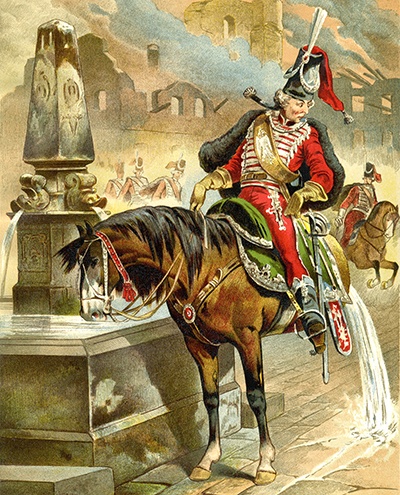
How to Write the First Sentence of Your College Essay
In general, your essay's first sentence should be either a mini-cliffhanger that sets up a situation the reader would like to see resolved, or really lush scene-setting that situates your audience in a place and time they can readily visualize. The former builds expectations and evokes curiosity, and the latter stimulates the imagination and creates a connection with the author. In both cases, you hit your goal of greater reader engagement.
Now, I'm going to show you how these principles work for all types of first sentences, whether in college essays or in famous works of fiction.
First Sentence Idea 1: Line of Quoted Direct Speech
"Mum, I'm gay." ( Ahmad Ashraf '17 for Connecticut College )
The experience of coming out is raw and emotional, and the issue of LGBTQ rights is an important facet of modern life. This three-word sentence immediately sums up an enormous background of the personal and political.
"You can handle it, Matt," said Mr. Wolf, my fourth-grade band teacher, as he lifted the heavy tuba and put it into my arms. ( Matt Coppo '07 for Hamilton College )
This sentence conjures up a funny image—we can immediately picture the larger adult standing next to a little kid holding a giant tuba. It also does a little play on words: "handle it" can refer to both the literal tuba Matt is being asked to hold and the figurative stress of playing the instrument.
First Sentence Idea 2: Punchy Short Sentence With One Grabby Detail
I live alone—I always have since elementary school. ( Kevin Zevallos '16 for Connecticut College )
This opener definitely makes us want to know more. Why was he alone? Where were the protective grown-ups who surround most kids? How on earth could a little kid of 8-10 years old survive on his own?
I have old hands. ( First line from a student in Stanford's class of 2012 )
There's nothing but questions here. What are "old" hands? Are they old-looking? Arthritic? How has having these hands affected the author?
There was no possibility of taking a walk that day. (Charlotte Bronte, Jane Eyre )
There's immediately a feeling of disappointment and the stifled desire for action here. Who wanted to go for a walk? And why was this person being prevented from going?
First Sentence Idea 3: Lyrical, Adjective-Rich Description of a Setting
We met for lunch at El Burrito Mexicano, a tiny Mexican lunch counter under the Red Line "El" tracks. ( Ted Mullin '06 for Carleton College )
Look at how much specificity this sentence packs in less than 20 words. Each noun and adjective is chosen for its ability to convey yet another detail. "Tiny" instead of "small" gives readers a sense of being uncomfortably close to other people and sitting at tables that don't quite have enough room for the plates. "Counter" instead of "restaurant" lets us immediately picture this work surface, the server standing behind it, and the general atmosphere. "Under the tracks" is a location deeply associated with being run down, borderline seedy, and maybe even dangerous.
Maybe it's because I live in Rhinelander, Wisconsin, where Brett Favre draws more of a crowd on Sunday than any religious service, cheese is a staple food, it's sub-zero during global warming, current "fashions" come three years after they've hit it big with the rest of the world, and where all children by the age of ten can use a 12-gauge like it's their job. ( Riley Smith '12 for Hamilton College )
This sentence manages to hit every stereotype about Wisconsin held by outsiders—football, cheese, polar winters, backwardness, and guns—and this piling on gives us a good sense of place while also creating enough hyperbole to be funny. At the same time, the sentence raises the tantalizing question: maybe what is because of Wisconsin?
High, high above the North Pole, on the first day of 1969, two professors of English Literature approached each other at a combined velocity of 1200 miles per hour. (David Lodge, Changing Places )
This sentence is structured in the highly specific style of a math problem, which makes it funny. However, at the heart of this sentence lies a mystery that grabs the reader's interest: why on earth would these two people be doing this?
First Sentence Idea 4: Counterintuitive Statement
To avoid falling into generalities with this one, make sure you're really creating an argument or debate with your counterintuitive sentence. If no one would argue with what you've said, then you aren't making an argument. ("The world is a wonderful place" and "Life is worth living" don't make the cut.)
If string theory is really true, then the entire world is made up of strings, and I cannot tie a single one. ( Joanna '18 for Johns Hopkins University )
There's a great switch here from the sub-microscopic strings that make up string theory to the actual physical strings you can tie in real life. This sentence hints that the rest of the essay will continue playing with linked, albeit not typically connected, concepts.
All children, except one, grow up. (J. M. Barrie, Peter Pan )
In just six words, this sentence upends everything we think we know about what happens to human beings.
First Sentence Idea 5: The End—Making the Rest of the Essay a Flashback
I've recently come to the realization that community service just isn't for me. ( Kyla '19 for Johns Hopkins University )
This seems pretty bold—aren't we supposed to be super into community service? Is this person about to declare herself to be totally selfish and uncaring about the less fortunate? We want to know the story that would lead someone to this kind of conclusion.
Many years later, as he faced the firing squad, Colonel Aureliano Buendía was to remember that distant afternoon when his father took him to discover ice. (Gabriel García Márquez, One Hundred Years of Solitude )
So many amazing details here. Why is the Colonel being executed? What does "discovering" ice entail? How does he go from ice-discoverer to military commander of some sort to someone condemned to capital punishment?
First Sentence Idea 6: Direct Question to the Reader
To work well, your question should be especially specific, come out of left field, or pose a surprising hypothetical.
How does an agnostic Jew living in the Diaspora connect to Israel? ( Essay #3 from Carleton College's sample essays )
This is a thorny opening, raising questions about the difference between being an ethnic Jew and practicing the religion of Judaism, and the obligations of Jews who live outside of Israel to those who live in Israel and vice versa. There's a lot of meat to this question, setting up a philosophically interesting, politically important, and personally meaningful essay.
While traveling through the daily path of life, have you ever stumbled upon a hidden pocket of the universe? ( First line from a student in Stanford's class of 2012 )
There's a dreamy and sci-fi element to this first sentence, as it tries to find the sublime ("the universe") inside the prosaic ("daily path of life").
First Sentence Idea 7: Lesson You Learned From the Story You're Telling
One way to think about how to do this kind of opening sentence well is to model it on the morals that ended each Aesop's fable . The lesson you learned should be slightly surprising (not necessarily intuitive) and something that someone else might disagree with.
Perhaps it wasn't wise to chew and swallow a handful of sand the day I was given my first sandbox, but it seemed like a good idea at the time. ( Meagan Spooner '07 for Hamilton College )
The best part of this hilarious sentence is that even in retrospect, eating a handful of sand is only possibly an unwise idea—a qualifier achieved through that great "perhaps." So does that mean it was wise in at least some way to eat the sand? The reader wants to know more.
All happy families are alike; each unhappy family is unhappy in its own way. (Leo Tolstoy, Anna Karenina )
This immediately sets readers to mentally flip through every unhappy family they've ever known to double-check the narrator's assertion. Did he draw the right conclusion here? How did he come to this realization? The implication that he will tell us all about some dysfunctional drama also has a rubbernecking draw.
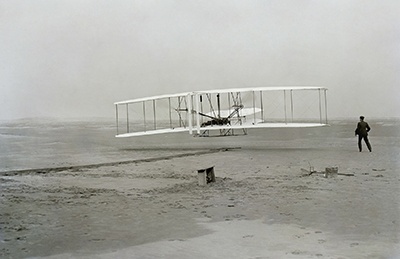
How to Write a Pivot Sentence in Your College Essay
This is the place in your essay where you go from small to big—from the life experience you describe in detail to the bigger point this experience illustrates about your world and yourself.
Typically, the pivot sentence will come at the end of your introductory section, about halfway through the essay. I say sentence, but this section could be more than one sentence (though ideally no longer than two or three).
So how do you make the turn? Usually you indicate in your pivot sentence itself that you are moving from one part of the essay to another. This is called signposting, and it's a great way to keep readers updated on where they are in the flow of the essay and your argument.
Here are three ways to do this, with real-life examples from college essays published by colleges.
Pivot Idea 1: Expand the Time Frame
In this pivot, you gesture out from the specific experience you describe to the overarching realization you had during it. Think of helper phrases such as "that was the moment I realized" and "never again would I."
Suddenly, two things simultaneously clicked. One was the lock on the door. (I actually succeeded in springing it.) The other was the realization that I'd been in this type of situation before. In fact, I'd been born into this type of situation. ( Stephen '19 for Johns Hopkins University )
This is a pretty great pivot, neatly connecting the story Stephen's been telling (about having to break into a car on a volunteering trip) and his general reliance on his own resourcefulness and ability to roll with whatever life throws at him. It's a double bonus that he accomplishes the pivot with a play on the word "click," which here means both the literal clicking of the car door latch and the figurative clicking his brain does. Note also how the pivot crystallizes the moment of epiphany through the word "suddenly," which implies instant insight.
But in that moment I realized that the self-deprecating jokes were there for a reason. When attempting to climb the mountain of comedic success, I didn't just fall and then continue on my journey, but I fell so many times that I befriended the ground and realized that the middle of the metaphorical mountain made for a better campsite. Not because I had let my failures get the best of me, but because I had learned to make the best of my failures. (Rachel Schwartzbaum '19 for Connecticut College)
This pivot similarly focuses on a "that moment" of illuminated clarity. In this case, it broadens Rachel's experience of stage fright before her standup comedy sets to the way she has more generally not allowed failures to stop her progress—and has instead been able to use them as learning experiences. Not only does she describe her humor as "self-deprecating," but she also demonstrates what she means with that great "befriended the ground" line.
It was on this first educational assignment that I realized how much could be accomplished through an animal education program—more, in some cases, than the aggregate efforts of all of the rehabilitators. I found that I had been naive in my assumption that most people knew as much about wildlife as I did, and that they shared my respect for animals. ( J.P. Maloney '07 for Hamilton College )
This is another classically constructed pivot, as J.P. segues from his negative expectations about using a rehabilitated wild owl as an educational animal to his understanding of how much this kind of education could contribute to forming future environmentalists and nature lovers. The widening of scope happens at once as we go from a highly specific "first educational assignment" to the more general realization that "much" could be accomplished through these kinds of programs.
Pivot Idea 2: Link the Described Experience With Others
In this pivot, you draw a parallel between the life event that you've been describing in your very short story and other events that were similar in some significant way. Helpful phrases include "now I see how x is really just one of the many x 's I have faced," "in a way, x is a good example of the x -like situations I see daily," and "and from then on every time I ..."
This state of discovery is something I strive for on a daily basis. My goal is to make all the ideas in my mind fit together like the gears of a Swiss watch. Whether it's learning a new concept in linear algebra, talking to someone about a programming problem, or simply zoning out while I read, there is always some part of my day that pushes me towards this place of cohesion: an idea that binds together some set of the unsolved mysteries in my mind. ( Aubrey Anderson '19 for Tufts University )
After cataloging and detailing the many interesting thoughts that flow through her brain in a specific hour, Aubrey uses the pivot to explain that this is what every waking hour is like for her "on a daily basis." She loves learning different things and finds a variety of fields fascinating. And her pivot lets us know that her example is a demonstration of how her mind works generally.
This was the first time I've been to New Mexico since he died. Our return brought so much back for me. I remembered all the times we'd visited when I was younger, certain events highlighted by the things we did: Dad haggling with the jewelry sellers, his minute examination of pots at a trading post, the affection he had for chilies. I was scared that my love for the place would be tainted by his death, diminished without him there as my guide. That fear was part of what kept my mother and me away for so long. Once there, though, I was relieved to realize that Albuquerque still brings me closer to my father. ( Essay #1 from Carleton College's sample essays )
In this pivot, one very painful experience of visiting a place filled with sorrowful memories is used as a way to think about "all the other times" the author had been to New Mexico. The previously described trip after the father's death pivots into a sense of the continuity of memory. Even though he is no longer there to "guide," the author's love for the place itself remains.
Pivot Idea 3: Extract and Underline a Trait or Value
In this type of pivot, you use the experience you've described to demonstrate its importance in developing or zooming in on one key attribute. Here are some ways to think about making this transition: "I could not have done it without characteristic y , which has helped me through many other difficult moments," or "this is how I came to appreciate the importance of value z, both in myself and in those around me."
My true reward of having Stanley is that he opened the door to the world of botany. I would never have invested so much time learning about the molecular structure or chemical balance of plants if not for taking care of him. ( Michaela '19 for Johns Hopkins University )
In this tongue-in-cheek essay in which Michaela writes about Stanley, a beloved cactus, as if "he" has human qualities and is her child, the pivot explains what makes this plant so meaningful to its owner. Without having to "take care of him," Michaela "would never have invested so much time learning" about plant biology. She has a deep affinity for the natural sciences and attributes her interest at least partly to her cactus.
By leaving me free to make mistakes and chase wild dreams, my father was always able to help ground me back in reality. Personal responsibilities, priorities and commitments are all values that are etched into my mind, just as they are within my father's. ( Olivia Rabbitt '16 for Connecticut College )
In Olivia's essay about her father's role in her life, the pivot discusses his importance by explaining his deep impact on her values. Olivia has spent the story part of her essay describing her father's background and their relationship. Now, she is free to show how without his influence, she would not be so strongly committed to "personal responsibilities, priorities and commitments."

College Essay Introduction Examples
We've collected many examples of college essays published by colleges and offered a breakdown of how several of them are put together . Now, let's check out a couple of examples of actual college essay beginnings to show you how and why they work.
Sample Intro 1
A blue seventh place athletic ribbon hangs from my mantel. Every day, as I walk into my living room, the award mockingly congratulates me as I smile. Ironically, the blue seventh place ribbon resembles the first place ribbon in color; so, if I just cover up the tip of the seven, I may convince myself that I championed the fourth heat. But, I never dare to wipe away the memory of my seventh place swim; I need that daily reminder of my imperfection. I need that seventh place.
Two years ago, I joined the no-cut swim team. That winter, my coach unexpectedly assigned me to swim the 500 freestyle. After stressing for hours about swimming 20 laps in a competition, I mounted the blocks, took my mark, and swam. Around lap 14, I looked around at the other lanes and did not see anyone. "I must be winning!" I thought to myself. However, as I finally completed my race and lifted my arms up in victory to the eager applause of the fans, I looked up at the score board. I had finished my race in last place. In fact, I left the pool two minutes after the second-to-last competitor, who now stood with her friends, wearing all her clothes.
(From "The Unathletic Department" by Meghan '17 for Johns Hopkins University )
Why Intro Sample 1 Works
Here are some of the main reasons that this essay's introduction is super effective.
#1: It's Got a Great First Sentence
The sentence is short but still does some scene setting with the descriptive "blue" and the location "from my mantel." It introduces a funny element with "seventh place"—why would that bad of a showing even get a ribbon? It dangles information just out of reach, making the reader want to know more: what was this an award for? Why does this definitively non-winning ribbon hang in such a prominent place of pride?
#2: It Has Lots of Detail
In the intro, we get physical actions: "cover up the tip," "mounted the blocks," "looked around at the other lanes," "lifted my arms up," and "stood with her friends, wearing all her clothes." We also get words conveying emotion: "mockingly congratulates me as I smile," "unexpectedly assigned," and "stressing for hours." Finally, we get descriptive specificity in the precise word choice: "from my mantel" and "my living room" instead of simply "in my house," and "lap 14" instead of "toward the end of the race."
#3: It Explains the Stakes
Even though everyone can imagine the lap pool, not everyone knows exactly what the "500 freestyle" race is. Meghan elegantly explains the difficulty by describing herself freaking out over "swimming 20 laps in a competition," which helps us to picture the swimmer going back and forth many times.
#4: It Has Great Storytelling
We basically get a sports commentary play-by-play here. Even though we already know the conclusion—Meghan came in 7th—she still builds suspense by narrating the race from her point of view as she was swimming it. She's nervous for a while, and then she starts the race.
Close to the end, she starts to think everything is going well ("I looked around at the other lanes and did not see anyone. 'I must be winning!' I thought to myself."). Everything builds to an expected moment of great triumph ("I finally completed my race and lifted my arms up in victory to the eager applause of the fans") but ends in total defeat ("I had finished my race in last place").
Not only that, but the mildly clichéd sports hype is hilariously undercut by reality ("I left the pool two minutes after the second-to-last competitor, who now stood with her friends, wearing all her clothes").
#5: It Uses a Pivot Sentence
This essay uses the time expansion method of pivoting: "But, I never dare to wipe away the memory of my seventh place swim; I need that daily reminder of my imperfection. I need that seventh place." Coming last in the race was something that happened once, but the award is now an everyday experience of humility.
The rest of the essay explores what it means for Meghan to constantly see this reminder of failure and to transform it into a sense of acceptance of her imperfections. Notice also that in this essay, the pivot comes before the main story, helping us "hear" the narrative in the way she wants us to.
Sample Intro 2
"Biogeochemical. It's a word, I promise!" There are shrieks and shouts in protest and support. Unacceptable insults are thrown, degrees and qualifications are questioned, I think even a piece of my grandmother's famously flakey parantha whizzes past my ear. Everyone is too lazy to take out a dictionary (or even their phones) to look it up, so we just hash it out. And then, I am crowned the victor, a true success in the Merchant household. But it is fleeting, as the small, glossy, plastic tiles, perfectly connected to form my winning word, are snatched out from under me and thrown in a pile with all the disgraced, "unwinning" tiles as we mix for our next game of Bananagrams. It's a similar donnybrook, this time ending with my father arguing that it is okay to use "Rambo" as a word (it totally is not).
Words and communicating have always been of tremendous importance in my life: from silly games like Bananagrams and our road-trip favorite "word game," to stunted communication between opposing grandparents, each speaking a different Indian language; from trying to understand the cheesemonger behind the counter with a deep southern drawl (I just want some Camembert!), to shaping a script to make people laugh.
Words are moving and changing; they have influence and substance.
From an Essay by Shaan Merchant ‘19 for Tufts University
Why Intro Sample 2 Works
Let's take a look at what qualities make this essay's introduction particularly memorable.
With the first sentence, we are immediately thrust into the middle of the action —into an exciting part of an argument about whether "biogeochemical" is really a word. We're also immediately challenged. Is this a word? Have I ever heard it before? Does a scientific neologism count as a word?
#2: It Shows Rather Than Tells
Since the whole essay is going to be about words, it makes sense for Shaan to demonstrate his comfort with all different kinds of language:
- Complex, elevated vocabulary, such as "biogeochemical" and "donnybrook"
- Foreign words, such as "parantha" and "Camembert"
- Colorful descriptive words, such as "shrieks and shouts," "famously flakey, "whizzes past," and "hash it out"
- "Fake" words, such as "unwinning" and "Rambo"
What's great is that Shaan is able to seamlessly mix the different tones and registers these words imply, going from cerebral to funny and back again.
#3: It Uses a Pivot Sentence
This essay uses the value-extraction style of pivot: "Words and communicating have always been of tremendous importance in my life." After we see an experience linking Shaan's clear love of his family with an interest in word games, he clarifies that this is exactly what the essay will be about—using a very straightforward pivoting sentence.
#4: It Piles On Examples to Avoid Vagueness
The danger of this kind of pivot sentence is slipping into vague, uninformative statements, such as "I love words." To avoid making a generalization the tells us nothing, the essay builds a list of examples of times when Shaan saw the way that words connect people: games ("Bananagrams and our road-trip favorite ‘word game,'"), his mixed-language family ("grandparents, each speaking a different Indian language"), encounters with strangers ("from trying to understand the cheesemonger"), and finally the more active experience of performing ("shaping a script to make people laugh").
But the essay stops short of giving so many examples that the reader drowns. I'd say three to five examples is a good range—as long as they're all different kinds of the same thing.

The Bottom Line: How to Start a College Essay
The college essay introduction should hook your reader and make her want to know more and read more.
Good personal statement introductions will contain the following features:
- A killer first line
- A detailed description of an experience from your life
- A pivot to the bigger picture, in which you explain why and how this experience has shaped you, your point of view, and/or your values.
You don't have to write the introduction first, and you certainly don't have to write your first sentence first . Instead, start by developing your story by telling it out loud to a friend. You can then work on your first sentence and your pivot.
The first sentence should either be short, punchy, and carry some ambiguity or questions, or be a detailed and beautiful description setting an easily pictured scene. The pivot, on the other hand, should answer the question, "How does the story you've told connect to a larger truth or insight about you?"
What's Next?
Wondering what to make of the Common Application essay prompts? We have the complete list of this year's Common App prompts with explanations of what each is asking as well as a guide to picking the Common App prompt that's perfect for you .
Thinking of applying to the University of California system? Check out our detailed guide on how to approach their essay prompts and craft your ideal UC essay .
If you're in the middle of the essay-writing process, you'll want to see our suggestions on what essay pitfalls to avoid .
Working on the rest of your college application? Read what admissions officers wish applicants knew before applying .

Anna scored in the 99th percentile on her SATs in high school, and went on to major in English at Princeton and to get her doctorate in English Literature at Columbia. She is passionate about improving student access to higher education.
Ask a Question Below
Have any questions about this article or other topics? Ask below and we'll reply!
Improve With Our Famous Guides
- For All Students
The 5 Strategies You Must Be Using to Improve 160+ SAT Points
How to Get a Perfect 1600, by a Perfect Scorer
Series: How to Get 800 on Each SAT Section:
Score 800 on SAT Math
Score 800 on SAT Reading
Score 800 on SAT Writing

Series: How to Get to 600 on Each SAT Section:
Score 600 on SAT Math
Score 600 on SAT Reading
Score 600 on SAT Writing
Free Complete Official SAT Practice Tests
What SAT Target Score Should You Be Aiming For?
15 Strategies to Improve Your SAT Essay
The 5 Strategies You Must Be Using to Improve 4+ ACT Points
How to Get a Perfect 36 ACT, by a Perfect Scorer
Series: How to Get 36 on Each ACT Section:
36 on ACT English
36 on ACT Math
36 on ACT Reading
36 on ACT Science
Series: How to Get to 24 on Each ACT Section:
24 on ACT English
24 on ACT Math
24 on ACT Reading
24 on ACT Science
What ACT target score should you be aiming for?
ACT Vocabulary You Must Know
ACT Writing: 15 Tips to Raise Your Essay Score
How to Get Into Harvard and the Ivy League
How to Get a Perfect 4.0 GPA
How to Write an Amazing College Essay
What Exactly Are Colleges Looking For?
Is the ACT easier than the SAT? A Comprehensive Guide
Should you retake your SAT or ACT?
When should you take the SAT or ACT?
Stay Informed
Get the latest articles and test prep tips!
Looking for Graduate School Test Prep?
Check out our top-rated graduate blogs here:
GRE Online Prep Blog
GMAT Online Prep Blog
TOEFL Online Prep Blog
Holly R. "I am absolutely overjoyed and cannot thank you enough for helping me!”

Personal Experiences Essay: Example and Tips

Talking about personal experiences is often much more difficult than researching a bunch of material and writing a scientific essay. In a personal essay, you need to reveal yourself, your soul and your thoughts, and this requires inner strength and confidence that you will be understood. Let us think together how to make writing essay on personal experiences easier. Another our goal is to write an interesting essay so that the reader will not stop reading it at the beginning.
- 1 9 reasons to write about personal experience
- 2 Tips of writing very good papers
- 3 Choosing the topic for personal experiences essay
- 4 Examples of topics for personal experiences essay
- 5.1 Tips for writing a travel essay
- 6 Personal experiences essay example. The story of my trip to Pakistan. How I stayed safe
- 7 How to write about real events
- 8 Personal experiences essay example. Today I almost died
9 reasons to write about personal experience
Let us think why it is useful to write about personal experience.
- Stories from life. Almost every reader likes reading success stories or life stories. That is why the parables are so wildly successful, because they are written in the language of stories. Each person has a personal story, which consists of many small stories.
- Only a few readers will pass by the headline “How I …”. These headlines are considered one of the most catchy. The teacher also reads such essays with more interest. For example:
- How I went through self-discipline
- How I was doing a marathon for losing weight
- How I started blogging
- How I see myself
- How I started living in the present
- Experience is important. Everybody know theoretical foundations or can get them in any second in the internet. Everyone wants to learn about other people’s personal experiences. Readers expect to learn useful information for them, which will be useful to them in life.
- Mistakes and failures. In personal experience, you can write about your mistakes and failures. You have probably often seen essays and articles like “How I lost a client, (home, wife)”. Or such as “Never repeat my mistakes.” “They laughed at me when I …” All your failures and mistakes can be submitted as a valuable life lesson. Some even write books about it and create courses, like in the movie with Will Smith.
- Be a practitioner. I constantly repeat this advice to the writers. Anyone who shares practical experience and advice, immediately falls into the category of experts. It’s like a breath of fresh air against the background of overload of general information. Informative essays are boring for the reader even when they contain important information. Essays about personal experiences are very different.
- Write down your experience and knowledge for yourself. You have everything in your head. And it is sometimes difficult to pull out from there, it seems that we know nothing or know enough. But when you write an essay, a book or an article, you can conduct a training, then the information is systematized and decomposed. It is useful for you.
- Your personal experience may be the beginning of your info business. If you are good in writing personal essays, you may use it for professional future. Many bloggers and copywriters eventually begin to conduct webinars and seminars, create their own courses and trainings. First, through the articles you create your own name and brand, and then sell something. Because experience is expensive, and people like to share their knowledge. Especially successful people do not hide anything, and willingly help those who really try.
- Others do not understand why you share the secrets of success with them. It’s all about the effort. The article on how to become creative said that the more time you invest in yourself, the harder it is to catch up with you. Therefore, beginners, knowing all your chips, will still have to spend hundreds of hours.
- Perhaps this is your mission in life. Sharing personal experiences and helping people is a worthy goal in life. I believe in personal growth and I believe in vocation. Maybe I want to believe it. Bring more meaning to everything you do. Find a deal bigger than yourself. Perhaps you will gain something more.
Tips of writing very good papers
Today, we all feel fatigue from the information flow entering the brain. The more valuable are the people who can write in an accessible, original and bright way. To write so that the reader could not tear himself away from the text.
How to write good, interesting papers? We offer tips for beginners. Use them and you will succeed.
- Formulate the topic in two simple sentences. Why such a restriction? Because it is the natural length of a clear answer to the oral question “What did you want to tell about?” If you cannot formulate a topic in two sentences attracting the reader’s attention, then something is wrong. A two-sentence constraint will help hone the thought, determine which lines and episodes are important, and which are minor. Repeat this technique for each chapter. It really helps to build the idea, plot and structure of the text on a segment of any length.
- Exploring the topic, try to keep a fresh look at things. Yes, you have read a thousand books on a topic, you are already a bit expert, but remain an alien, a child who is surprised at what adults have accepted and does not hesitate to ask questions.
- There are necessary details and there are details that are not important, but this is not the same thing. Details are the signs of the hero, the episode, telling something important about a person, landscape, sketch. And another details are malicious, insignificant clarifications, without which it would be possible to do.
- Try to have one, maximum two digits per paragraph. Unless, of course, you are not writing an essay on accounting or math.
- You shouldn’t immediately give away trumps: it’s better to hold the most striking episode, but to start a little from afar, in the first sentences you can confuse the reader a little, but you need to get him interested.
- On the Internet you can find, patiently googling, at least 20 ways to combat procrastination. But, as practice shows, only two of them work properly.
Method A is to calculate in advance how many thousands of characters you need to write for today – and, when procrastination entangles you, start writing as much as you like, but according to a detailed plan. Through force, stubbornly – and without literary processing at the same time, just write what you think about this matter. This activity in itself brings the electrodes to the brain, and after a while it will spark.
Method B is to talk to yourself, to speak out loudly in a free form in response to the question “what I want to say in this piece.” Having spoken, we, as a rule, find successful formulations or moves for the beginning of one or another piece, or even the entire text. After a few minutes, if you realize that today it is easier for you to speak, turn on a prepared voice recorder. Again, the author at this moment looks like a schizophrenic, but this technique works.
- Unnecessary words are the most terrible enemies. After writing the phrase, look at it and throw away half the words. Does not work? Change the wording to work out.
- Do not use constructions of three verbs or adjectives in a row.
- Invalid bureaucracy like “carried out the scheduled repair work.” Much better it looks like “repaired”.
- Every time, looking at a complex description of a complex phenomenon, try to put it into a capacious phrase of four or five words. Assign yourself a figure for which you can not go.
Choosing the topic for personal experiences essay
In practice, it often happens that the freer theme for an essay you get, the more difficulties you experience when choosing the topic. In case of personal experiences essay, you might consider the following directions of thinking:
- Tell about a person, whose meeting has changed you, your life or your life views;
- Tell about a particular event that has stayed in your memory for some reason;
- Tell about the turning point of your life. What has made you the way you are today?
In any case, choose the topic wisely, as you need to be able to write an essay about it. The main here is to feel free talking about it. As some things are to private and personal and we try to avoid discussing them with strangers. Do not choose the topic that is offensive to you or someone else, as it might cause a conflict. Remember that you are about writing an essay on personal experience not a diary. Tell what you want to share not something you want to hide.
Examples of topics for personal experiences essay
- How I decided to become a lawyer
- Why honesty has become my main principle in life
- When I was a kid
- My experience of going abroad
- A person who has changed me
- My life – my rules
- The story of my biggest failure in life. What did it teach me?
How to write essay on personal experience of travelling
To write an assay is not an easy and quick work, it requires the investment of a considerable amount of labor. Continuous sitting at the computer can cause considerable health problems. But these are already professional problems of students. I will return to the topic and talk about ways to write an article about the journey.
Tips for writing a travel essay
Travel essay require concentration, memory stress, when you maximize your creativity. It is necessary to describe sights, landscapes and life in bright colors and emotions. Travel essays have common features that are highlighted in the list below:
- Leave your feedback in the essay – personal impressions. When you go on vacation, of course, you get personal impressions. Therefore, the essay about the journey is written in the first person and contains a review of the past trip, vacation.
- The traveler writes about the places he visited, what sights he saw. Since everyone stays in hotels, do not forget to tell in all colors about service and maintenance, why you liked it and why not.
- When sharing information, avoid inaccurate expressions. A useful essay is distinguished by its specifics, exact facts and clarifications. Write to the prices encountered by the attitude of ordinary people to you. This will help convey the experience gained to the reader. The reader will be delighted with such a text.
- Deliver to the reader something new and interesting, and not well-known facts about a country or a city. Without this, the reading of the material will be bland and not fascinating, because the facts are banal that everyone knows them.
- Attention to detail. When you write about your own journey, do it with a fresh mind, right after arriving from vacation. Thanks to this, story of the adventures will be full of details about the local exotic, life, and relationships. What a taste of the food eaten a couple of days ago was, what smell you felt when you smelled a beautiful flower. Share your feelings and sounds you heard or music. It is interesting to learn to any reader.
Personal experiences essay example. The story of my trip to Pakistan. How I stayed safe
“Pakistan is not the most attractive country by tourists. It is located between Afghanistan and India, and many associate with danger, from which it is worth keeping away.” That is what I knew and thought about Pakistan before visiting it.
However, when you find yourself in Pakistan, the first thing you notice is the bright contrast between the image of the most dangerous state and the terrorists, where explosions thunder every day, and the reality that a tourist can walk at three o’clock in the morning without fear and when almost everyone is sincerely happy to help you.
As it turned out, the Pakistani friendliness has no limits. So, in one small town for 48 days only 48 people approached me with a request to take a picture. I must say, I also showed interest and asked for permission to take pictures – men and children happily agreed, but I always received a refusal from women.
People in Pakistan are very diverse – from black brown-eyed to blue-eyed with fair skin. When you see such an unusual combination, you involuntarily start to admire, especially if such eyes look at you from under the burqa. Sometimes you want to come and talk, but in this country, it can end badly.
In one of the villages I happened to see children who begged on the street. When you see them, you realize how sad the future of a child from a poor family or orphan in Pakistan is, in a country with a population of 190 million people, where prospects are minimal. And such children cannot be helped except to take responsibility, to adopt and take them to another country. It is noteworthy that the adoption procedure in Pakistan is very simple, but there is one condition: since the child is Muslim, he must be raised as a Muslim, and for this, adoptive parents of another religion need to adopt Islam.
Most tourists coming to Pakistan go to the north of the country, where they meet three mountain ranges – the Kara Kum, the Himalayas and the Hindu Kush with 150 mountain peaks over 7,000 meters high. Tourists also travel to the Hunza Valley, which is famous for its beautiful scenery and artificial lake, formed as a result of the collapse of the mountain. You can also talk with local ethnic minorities, who preach a special kind of Islam that allows them to prepare and drink alcohol, so even in a country like Pakistan alcohol is quite accessible.
Many tourists just come to the mountains to go on short day walks, and some go on multi-day routes, where they do not come across villages and there is no place to buy food, everything has to be borne by yourself. So we decided to do it. Having passed half of the route, we once again camped, cooked food and went for a walk, and on our return found that almost all of our supplies were eaten by cows. Thus, without finishing the route, we had to turn back, but the beauty of the landscapes smoothed out the disappointment.
Tourists in Pakistan are attracted not only to the mountains, monuments included in the UNESCO World Heritage List are available for history lovers. There are several unique fortresses scattered throughout the country, mosques, necropolis and the ruins of ancient cities. Nevertheless, the most important thing to pay attention to in Pakistan is the people. Here you can start a conversation with almost any person on the street, and if you cause sincere interest, you will be invited for a tea.
Many people ask about security there. Well, it is difficult to say for sure. For example, the embassies of the United States, Great Britain and some other countries categorically do not recommend going to this country because of the threat of terrorism. In fact, it is rather a warning about the unpredictability of the situation than a real calculation that a terrorist act is bound to happen soon.
But one thing is for sure: in regions where tourists mainly travel, you will be safer. In Pakistan, 70% of the budget is spent on the army and it controls the entire country. Taliban is driven into the mountains of Afghanistan. Widespread police outposts are commonplace, and I felt completely safe all the time, even when I walked through the streets of Lahore at night. However, there are regions which are better to be avoided. For example, in the city of Karachi, terrorism and crime flourish. According to the local government, there are troubled places in the west of the country, and all because of the proximity to Afghanistan – you just will not be allowed there.
99% of tourists in Pakistan visit the highlands in the north of the country, the capital and the city of Lahore. I decided to go to the west, to the city of Bahawalpur. As usual, on arrival at a new place, the first thing a person does is go to look for housing. So did I. I will say that it is difficult to surprise me, since I travel a lot, but I was at a loss when I was told that it was forbidden for tourists to stay in the city. I said, “Let’s make a deal, no one will know anything,” but I was told that every few days the police arranged raids. After that, the one with whom I spoke, called the police. After 15 minutes an armored car with six policemen arrived and took me to the base, where it was then decided to lodge me in the most fortified and expensive hotel in the city.
Upon arrival there, it turned out that there were no vacancies, but since the police insisted on being accepted, they placed me in the conference room. Since my weekly budget was spent due to the hotel, I decided to quietly leave, take a bus and continue on my way, but at the exit a smiling clerk told me: “Wait, please,” and then started to call somewhere. Half an hour later the police arrived, who forbade me to move on my own and insisted that I call a taxi. Since I had a long way to go, I had to agree. The car arrived, I sat in the front seat, and in the back there were two law enforcement officers with automatic weapons, who didn’t move a single step from me all day.
When the initial stupor from the presence of the police passed, we started talking and at the end of the day we even became friends. They explained to me that such increased attention was necessary for reasons of safety and respect for the guests. It can be said that laws in Pakistan are not enforced and laws do not work, but the unwritten rules (such as taking care of guests) are strictly observed here.
How to write about real events
Writing an essay based on real events is both a risk and a responsibility. Many beginning authors want to start with this, real events (especially from their own lives) seem to be simpler to describe. However, there are pitfalls here. To base a paper on real events is, first of all, the risk to be subjective. Psychologists say that such an author is actually engaged more in self-healing and savoring himself than in literature. Therefore:
- It is better to write such works when the author has already experience in writing and professionalism. Then he will avoid most mistakes.
- Forget about ambitions. You must treat yourself, your talent and text is more critical than anyone. You can not think that your life experience is unique. This killed more than one author. It is important to know exactly what your experience is of interest to others and to have data that this knowledge is in demand.
- Understand your reader, and most importantly – figure out what he needs and what is interesting for him. Suppose you write for women from 25 to 30 years. You need not just to assume, but to find out exactly, based on data from surveys, research and statistics – what exactly interests women of a given age, exactly what things they want to read, what they are looking for. And ask yourself afterwards – does this correspond to what you want to tell them?
- Maximize your target audience. The trouble is that most papers based on real events are only interested in a narrow circle of people of similar environments, life principles, and experience. Therefore, you need to add plot threads, details that will expand the circle of your readers.
- Remember that even in such a work fiction should be present. And it should relate to the characters and the plot, and not the entourage (it is not enough just to retell the real events, changing the name of the hero, the city, the detail of the exterior and the time of year). The ratio should be the following: 20-30% of truth, 70-80% of artistic fiction.
- Study the interesting topics, relevance, relevance.
Personal experiences essay example. Today I almost died
Today I almost died. I almost choked to death in my own bed. And you know what, it’s weird to be dying. I do not want to talk like an experienced adult. I am only 18 years old. It is too early for me to die. And it scares.
How did this happen? I will tell. I remember everything in the smallest details:
Suddenly, there was a very lack of air, a terrible fit of coughing, without the possibility of breathing. All this has happened before. Well, what to do? That is life. Failed to turn and here it is, the result. However, this time it was different. I’ve almost died. The coughing attack without the slightest breath continued, it seems, for ages. But, oddly enough, there was no pain. Quite. Like fear, I was frightened much later.
The body struggled for life itself, you will not believe it, but at that moment I was not aware of anything. That is absolutely nothing. No, of course, I understood that something was wrong, but I had no idea what I was doing and why I was doing just that.
You know, experience saved me. Since childhood, I really love to sing. At the present time I am writing my songs too. Sometimes I speak. People involved in singing will understand me. Sometimes during a song a breath is left no more than half a quarter of a second. And on this breath you have to hold about 3-5 seconds of the song. It can be difficult. But it saved me. Well … I think so.
At that moment, when there was no air in the lungs at all, I still managed to seize the moment in order to get a thing so vital for life as oxygen. You will laugh, but even at that moment the body acted itself, the mind remained on the sidelines. Now it seems to me that I just remembered everything that is happening. And from this it becomes scary.
Here people say about the life flashed before his eyes, the faces of angels, demons, about the fears and fantasies that appear before death. Personally, I did not have this. I just realized that this was the end. That’s all. It’s good that the end hasn’t come yet.
But returning to consciousness for a long time I thought that it would be extremely foolish to die like this. However, it would be fun. In general, not the worst death, do not you think? It seems to me that this is so. I imagined everything that would happen if I died.
Most of all I was saddened that many good words would have been said about me. I realized that I was kind of a good person. I have a family. I have friends. Yes, and many people would regret my death. I sincerely regretted. You know, it’s nice to know that there are those who care whether I am dead.
It’s a pity that I’m not really doing anything that’s really worthwhile in my life. It would be a shame to die without leaving a mark, even a small one. All my songs were always kept only in my head and there are hardly any people who remember at least one by heart. Yes, and it is unlikely that they can be called worthwhile. In general, it would be very sad to leave. I am very glad that I did not die. Friends, try not to die. For myself, I realized that to die now would be very offensive. If possible, try to postpone your death until better times.
How to Start a College Essay: 5 Effective Techniques

Access thousands of exclusive scholarships for free

"Be Bold" No-Essay Scholarship
Impressionable Openers
Descriptions and demonstrations, show vulnerability, be authentic, stay personal, fun & quirky, common mistakes to avoid in your college essay.
- Ways to Overcome Writer's Block
Frequently Asked Questions About Starting a College Essay
College essays are a huge part of your college career. If not huge, one of the biggest, and for someone who has been there and done that, I know the amount of pressure the beginning of a college essay, as well as the entire essay, can put on your shoulders.
Not only are you trying to juggle things like word count and grammar errors, but you're also trying to create the perfect college essay introduction that will attract admissions officers to your application or professors to your writing skills. And that, itself, can feel impossible, fill you with dread and self-doubt, but just breathe. I am here to help all present and future students know how to start a college essay.
Today is all about starting a college essay. I have come up with five easy and effective techniques that will help you create essays so good you're going to leave your readers wanting more , starting with your opening sentence! So, this is for all college students and college applicants. Stress no more! This guide was created to help you write a successful college essay. Let's get into it.
Visit our Scholarship Blog to learn how to create your free Bold profile , and start applying for scholarships designed to help you save BIG on your college education.

The beginning of your essay should, first and foremost, always have a strong opening sentence . This sentence sets the tone for not only your readers but for the entire essay. Having a wobbly, almost interesting opener can steer an admissions officer and/or professor away, so you want it to be strong. And it doesn't have to be complicated! Less is more in this situation. Here are a couple of ways you can accomplish this.
- Look within and be relatable
- Use your real life for inspiration
- Think about ways to evoke emotion
Here are some examples of impressionable openers:
- Example 1: When I was 11 years old, my mother told me she had cancer over breakfast.
- Example 2: Maybe yellow isn't my favorite color.
- Example 3: I sat next to this girl in class who made me feel stupid.
DISCLAIMER : your opener should ALWAYS adhere to the essay prompts. These are just a few examples that can capture your reader's attention almost immediately.
In order to keep readers interested, visuals are key . Image-based descriptions will not only add value to your writing, it will give your readers front seats to your essay's journey. These descriptions let actions speak for themselves.
Here is an example of a description and demonstration in an essay:
- Example 1: "I was sitting on a bar stool when the word 'cancer' hit me like the smell of her coffee brewing on the stove. The Rice Krispies were popping in my cereal bowl, and MTV Jams was playing in the background, yet all I could hear was the sound of doom all around me. The lips of my mother were moving, but I was frozen, crumbling on this stool like my mother's health. She was sick, and I didn't know how sick or what that even meant, and that terrified me."
Why This Works:
Here you can clearly feel the writers emotional state: shocked, still, scared. Not only is this moment at breakfast traumatic, you feel frozen in time with the writer. Using descriptions like this will evoke so much emotion and leave your reader wanting more.
Get Matched to Thousands of Scholarships
Create your Bold.org profile to access thousands of exclusive scholarships, available only on Bold.org.
Something one of my teachers told me in high school was any good essay will have personal elements in it, no matter the topic. That always stuck with me and became the way I approached my college essays. Showing vulnerability in your writing will always guarantee interest. It also evokes emotion.
You can show vulnerability by:
- Being honest
- Explaining what's going on inside underneath the exterior
- Describe what's going on around you at the moment
- Letting go of the fear of being seen
- Connecting with the topic
- Being transparent about mistakes/flaws
Examples of showing vulnerability:
- Example 1 : My mother telling me she had cancer over breakfast was not on my bingo card this year.
- Example 2 : I never thought losing someone I love would change me.
- Example 3: I had to lose everything in order to gain everything.
I know being vulnerable can be tough for some , but showing this side of you to college admissions officers and/or professors will not only make you stand out, but it can also help free you of things that might be weighing on your mind. Not to sound corny, but it can be therapeutic and make you a better writer . Just make sure you are staying on track with the essay prompt, and you're set!
Whether it's believed or not, an admissions officer wants to see pieces of you in your personal statement, so starting your essay by showing authenticity is a major major key. Along with being vulnerable, there are a few ways you can achieve this.
- Reflect : Take the time to reflect on your experiences, values, and beliefs that have shaped who you are today. Let your values, passions, and interests shine through in your writing.
- Mind Your Voice : Write in your own voice and avoid trying to sound like someone you're not. Authenticity comes from being genuine and true to yourself.
- Tell Your Story : Share personal anecdotes and insights that show your unique perspective.
- Be True to You : Focus on what matters to YOU (as long as you're on topic!). Write about what is meaningful and important to you rather than what you think admissions officers want to hear.
Above all, be open . Showing introspection and self-awareness in your essay will show any admissions committee who you are beneath the surface, as well as your personal growth.
You can also begin your essay being as random and silly as you'd like . It goes hand-in-hand with other important factors like vulnerability and authenticity. But don't get too crazy . Beginning your essay with something strange will definitely draw readers in. Let me show you what I mean.
- Example 1 : I start my mornings off in silence and solitude to keep people away from me.
- Example 2 : Sometimes, I like to circle big words in complex articles to learn new words. Yeah, but to also keep one in my back pocket for later use.
- Example 3 : Being the youngest child means getting away with everything you want, and that's exactly how I like it.
Do you see how each sentence draws you in? Not only are they light-hearted, but they also make you want to know why you want to keep people away in the morning and what kind of weapon you're forming against others with new words. And every youngest sibling will attest to feeling that exact same way. All of these examples are sure to make your essay fun, show who you are, and leave readers wanting more.

Years of writing college essays have taken me through every high and low of the process possible. And when they're good, they're great! But for some reason, my mistakes stick out more than anything. So, I've compiled a list of common mistakes to avoid when writing your college essay .
- Avoid Being Cliche - While you want to be captivating, you want to avoid overly used syntax and phrases that could potentially lose your reader's curiosity. For example, "in today's day and age," "follow my heart," "don't judge a book by its cover," etc. are all cliches that can be avoided by thinking outside of the box.
- Using Vocabulary to be Impressive - I know you want to impress the admissions committees, but it's important to stick to what you know and not what you can allude to. That is, use verbiage that resonates with your personality. Using extravagant words can work against you, and they can also sound forced. College admissions officers want to see the real you, so show it to them.
- Steer Clear of Controversy - Though it's not said enough, your college essay should tell your personal story and not touch on things that can stir the pot. For instance, talking about politics and religious beliefs may not be the route you want to take UNLESS it's called for in the college essay topic. And if so, stay on track with the essay prompts.
- Procrastinating : Waiting until the last minute to start writing your essay will bite you in the butt. You will feel rushed and end up writing a poorly crafted piece. Give yourself enough time to complete an essay draft, edit the draft, and repeat this two-step cycle until your essay is complete.
- Lack of originality : This goes hand-in-hand with avoiding cliches. Your college essay should exude a lot of your personality, so show admissions officers and teachers who you are! Include your cultural background, test scores that you're proud of, any future aspirations, etc. This all depends on the essay prompts, of course, but in my experience, every essay topic has room to show who you are.
- Ignoring the prompt : This is a major key. STAY ON TRACK. Make sure to carefully read and understand the essay prompt, and write your essay accordingly. The last thing you want to do is write a college essay that has nothing to do with the prompt. Reading is essential here.
- Lack of focus : If you want to know how to start a college essay, that means knowing how to stay focused. Find a quiet space, turn off electronics, hide your phone, and really nestle into how you want to capture your reader's attention. This will help you use your five senses clearly, keep your writing strong and not write an overly wordy essay. Focus is the tool here.
- Poor organization : Make sure your essay has a strong structure with clear transitions between paragraphs. An outline will work best to accomplish this. If you go into starting your college essay without a plan, be prepared to hit all roadblocks.
- Neglecting to Revise and Edit : Like procrastinating, don't fail to revise and edit your work. Always, always, always proofread your essay for grammar, spelling, and punctuation errors , as well as clarity and coherence.
- Not Seeking Feedback : Listen, I know that completing an essay is an accomplishment in itself, and you immediately want to submit it, but it's so beneficial to have others read your essay for feedback. You can only spot so many holes in your work when your eyes are constantly reviewing it, so a second, third, or even fourth set of eyes can help point out areas for improvement.
Above all, trust the writing process. Though I do want you to be aware of your jargon, don't get too wrapped up in thinking you're making a mistake. That's what editing is for! Once you complete your college essay, you should always revise and edit accordingly . What you thought sounded good might make you edit it to sound great. Just keep in mind that many colleges are looking for honesty and authenticity vs how well you can sound on paper . So, if you're aware of these factors, you'll be good to go.

Ways to Overcome Writer's Block
Take it from someone who has suffered from chronic writer's block, it's a pain to get through . Imagine being on a writing streak so good that when you stop, the entire essay writing process stops as a whole. It's definitely a challenge, but after 10 years of writing essays and really honing my craft, I learned a few things that have helped me get through even the thickest of writer's blocks, and I want to share them with you. Check them out:
- Take a break : This works every single time. Take a short break and step away from your computer to clear your mind and come back with a fresh perspective. For me, 15 minutes is all I ever need. If you need more time, that's okay. Just try not to make your break a rest.
- Freewriting : Sometimes, I'd start writing without worrying about my structure or grammar to get the ideas flowing, and surprisingly enough, I found my essay taking a pleasant turn.
- Change your environment : Move around. Don't underestimate the effects of a different location or workspace to stimulate creativity. Try coffee shops, bookstores, a park, or a new room in your house. New environment, new energy.
- Set small goals : This one is actually the most important. Some people get overwhelmed with the word "essay" for things like lack of proper writing skills, pressure to write a great essay, etc. But if you try breaking down your writing task into smaller, manageable chunks to make it less overwhelming, it can help. For example, set a goal of three paragraphs one day, take a day to edit those paragraphs, two more the next day, and so forth. Find a formula that works for you.
- Brainstorming : Write down all your ideas--everything. No matter how small you think the idea is, write it down. Even if these ideas seem unrelated, they will help you generate new thoughts and connections.
- Read or listen to music : It took me a while to realize this helps, but engaging in other forms of art can inspire new ideas and break through mental blocks. And new creativity can lead you to impress admissions officers.
- Talk it out : As a writer, it's hard to let people in on the creative process, but discussing my ideas with a friend, family member, or colleague helped me gain new perspectives and insights.
- Relax and Meditate : Hear me out: it works! Practice deep breathing and/or meditation to reduce stress and anxiety that may be contributing to writer's block.
I won't sugarcoat it: the college application process can be intimidating , but it doesn't have to throw you off your game. When it comes to college essays, I see them as opportunities to be fun and expressive. Trust me when I say if you have fun with it, you'll attract the reader's attention , paint vivid details, and write an essay that will leave the admissions officer wanting you at their school. So, take it one step at a time and watch your personal statement come to life.

How can I make my college essay stand out to admissions officers?
Simply put, be yourself. As long as you stay on track with the essay's topic, showing pieces of yourself will allow admissions officers to know more about who you are. Essays are meant to show readers who you are, how you feel, and what you think naturally, not robotically, so be authentic in your writing, and you'll be sure to stand out amongst the rest.
What are some common mistakes to avoid when writing a college essay?
Some common mistakes to avoid in your essay are using cliches and boring wording. You also want to avoid procrastinating, wasting time, not focusing, not editing, etc. When writing your essay, you want to make sure you give your writing the time and attention it deserves, so make sure you're aware of what is pulling you away from your writing. This will help you stay focused. If you have any other doubts, refer to the section about mistakes in this article and let it guide you to success.
How important is the college essay in the admissions process?
Your college essay is key in the admissions process . It's an admissions committee's first impression of you as a writer and potential student, so it should be taken very seriously. Trying to cut corners or rush through the writing process will be obvious, and it will stand out more than things like test scores, academic achievements, extracurricular activities, and any other positive influence you've had in your life. So, don't take the easy way out and really work on your essay.
Feeling confident in your college essay skills and want to explore some other essay content? Explore our blog on the comma splice to enhance your technical writing skills!
Related Posts
10 strategies for writing a college application essay, what is a coordinating conjunction, best colleges in tennessee.
The writer of the academic essay aims to persuade readers of an idea based on evidence. The beginning of the essay is a crucial first step in this process. In order to engage readers and establish your authority, the beginning of your essay has to accomplish certain business. Your beginning should introduce the essay, focus it, and orient readers.
Introduce the Essay. The beginning lets your readers know what the essay is about, the topic . The essay's topic does not exist in a vacuum, however; part of letting readers know what your essay is about means establishing the essay's context , the frame within which you will approach your topic. For instance, in an essay about the First Amendment guarantee of freedom of speech, the context may be a particular legal theory about the speech right; it may be historical information concerning the writing of the amendment; it may be a contemporary dispute over flag burning; or it may be a question raised by the text itself. The point here is that, in establishing the essay's context, you are also limiting your topic. That is, you are framing an approach to your topic that necessarily eliminates other approaches. Thus, when you determine your context, you simultaneously narrow your topic and take a big step toward focusing your essay. Here's an example.
The paragraph goes on. But as you can see, Chopin's novel (the topic) is introduced in the context of the critical and moral controversy its publication engendered.
Focus the Essay. Beyond introducing your topic, your beginning must also let readers know what the central issue is. What question or problem will you be thinking about? You can pose a question that will lead to your idea (in which case, your idea will be the answer to your question), or you can make a thesis statement. Or you can do both: you can ask a question and immediately suggest the answer that your essay will argue. Here's an example from an essay about Memorial Hall.
The fullness of your idea will not emerge until your conclusion, but your beginning must clearly indicate the direction your idea will take, must set your essay on that road. And whether you focus your essay by posing a question, stating a thesis, or combining these approaches, by the end of your beginning, readers should know what you're writing about, and why —and why they might want to read on.
Orient Readers. Orienting readers, locating them in your discussion, means providing information and explanations wherever necessary for your readers' understanding. Orienting is important throughout your essay, but it is crucial in the beginning. Readers who don't have the information they need to follow your discussion will get lost and quit reading. (Your teachers, of course, will trudge on.) Supplying the necessary information to orient your readers may be as simple as answering the journalist's questions of who, what, where, when, how, and why. It may mean providing a brief overview of events or a summary of the text you'll be analyzing. If the source text is brief, such as the First Amendment, you might just quote it. If the text is well known, your summary, for most audiences, won't need to be more than an identifying phrase or two:
Often, however, you will want to summarize your source more fully so that readers can follow your analysis of it.
Questions of Length and Order. How long should the beginning be? The length should be proportionate to the length and complexity of the whole essay. For instance, if you're writing a five-page essay analyzing a single text, your beginning should be brief, no more than one or two paragraphs. On the other hand, it may take a couple of pages to set up a ten-page essay.
Does the business of the beginning have to be addressed in a particular order? No, but the order should be logical. Usually, for instance, the question or statement that focuses the essay comes at the end of the beginning, where it serves as the jumping-off point for the middle, or main body, of the essay. Topic and context are often intertwined, but the context may be established before the particular topic is introduced. In other words, the order in which you accomplish the business of the beginning is flexible and should be determined by your purpose.
Opening Strategies. There is still the further question of how to start. What makes a good opening? You can start with specific facts and information, a keynote quotation, a question, an anecdote, or an image. But whatever sort of opening you choose, it should be directly related to your focus. A snappy quotation that doesn't help establish the context for your essay or that later plays no part in your thinking will only mislead readers and blur your focus. Be as direct and specific as you can be. This means you should avoid two types of openings:
- The history-of-the-world (or long-distance) opening, which aims to establish a context for the essay by getting a long running start: "Ever since the dawn of civilized life, societies have struggled to reconcile the need for change with the need for order." What are we talking about here, political revolution or a new brand of soft drink? Get to it.
- The funnel opening (a variation on the same theme), which starts with something broad and general and "funnels" its way down to a specific topic. If your essay is an argument about state-mandated prayer in public schools, don't start by generalizing about religion; start with the specific topic at hand.
Remember. After working your way through the whole draft, testing your thinking against the evidence, perhaps changing direction or modifying the idea you started with, go back to your beginning and make sure it still provides a clear focus for the essay. Then clarify and sharpen your focus as needed. Clear, direct beginnings rarely present themselves ready-made; they must be written, and rewritten, into the sort of sharp-eyed clarity that engages readers and establishes your authority.
Copyright 1999, Patricia Kain, for the Writing Center at Harvard University

Reflective Essay
Reflective essay generator.
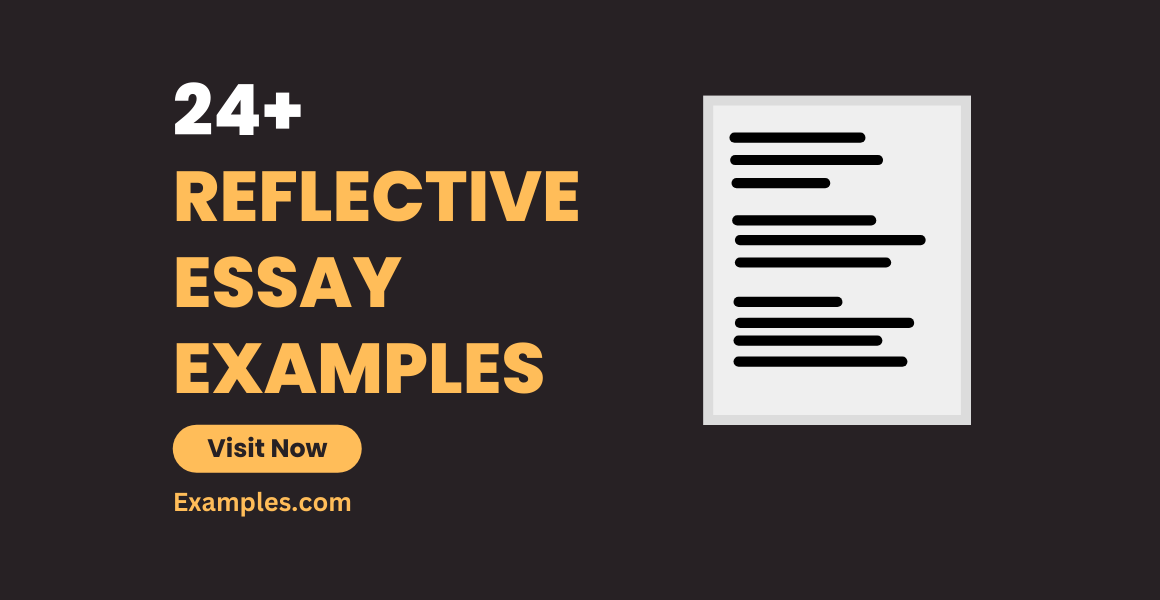
Sometimes, it is our experiences that startled and challenged our own voyage that strengthens and improves us to be the best versions of ourselves. If your life experience greatly moved you, there is a certain essay that allows you to compose your own endeavor. In this article, read through because we will be discussing the fundamentals of writing a reflective essay.
They say that being wise is better than being knowledgeable. Wisdom is acquired through reflection of one’s experience as well as of the environment. The more we reflect the more we become aware of ourselves. We become mindful of our existence as well as the meaning of life and all the things that surround us. Here we present different formats of essays like essays in doc .
Reflective Essay Outline Template
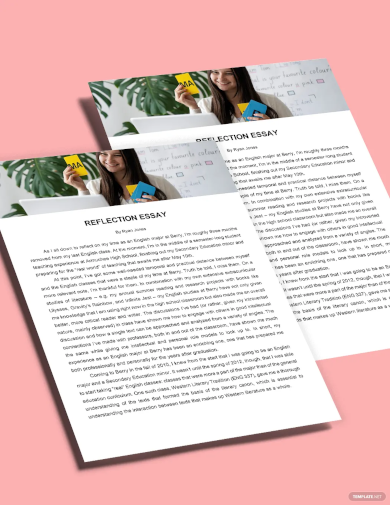
- Google Docs
Size: 188 KB
Reflective Essay About Life Experience
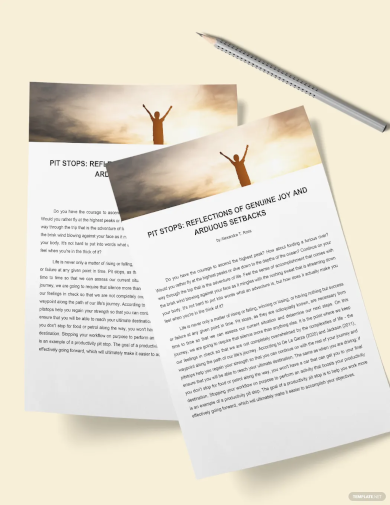
- Apple Pages
Size: 142 KB
Reflective Essay Template
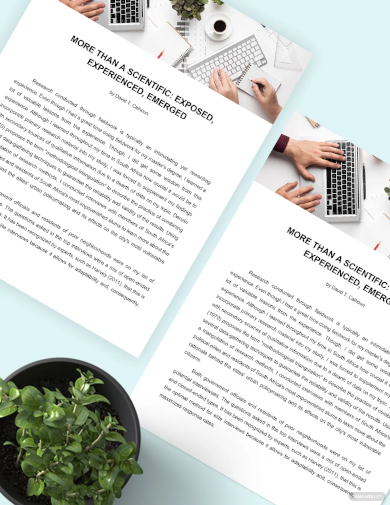
Size: 237 KB
Self Reflective Essay Template
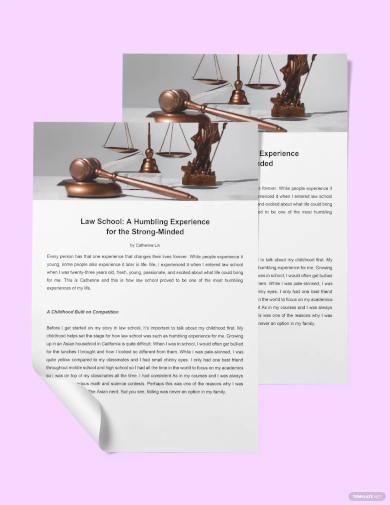
Size: 114 KB
Personal Reflective Essay Template
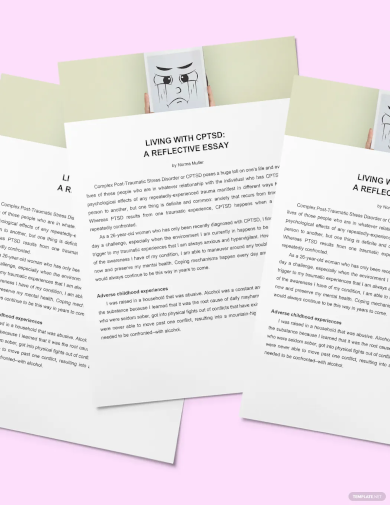
Size: 126 KB
Personal Reflective Sample
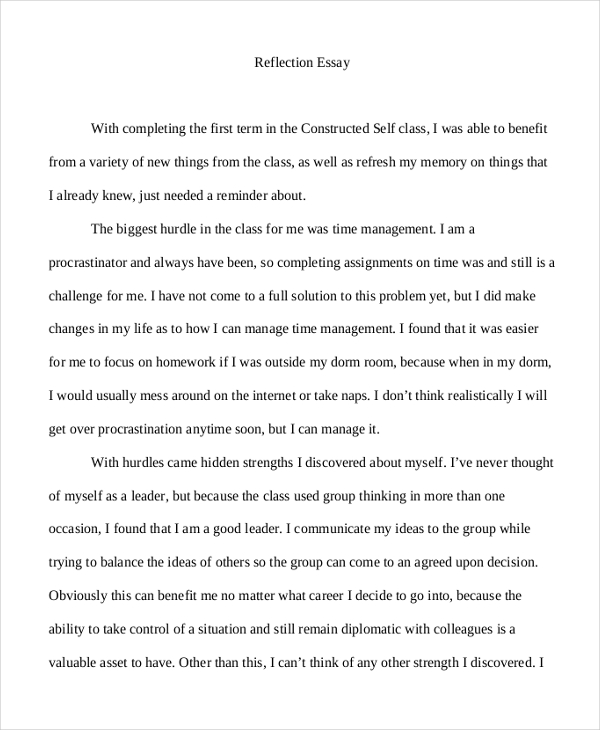
High School Essay
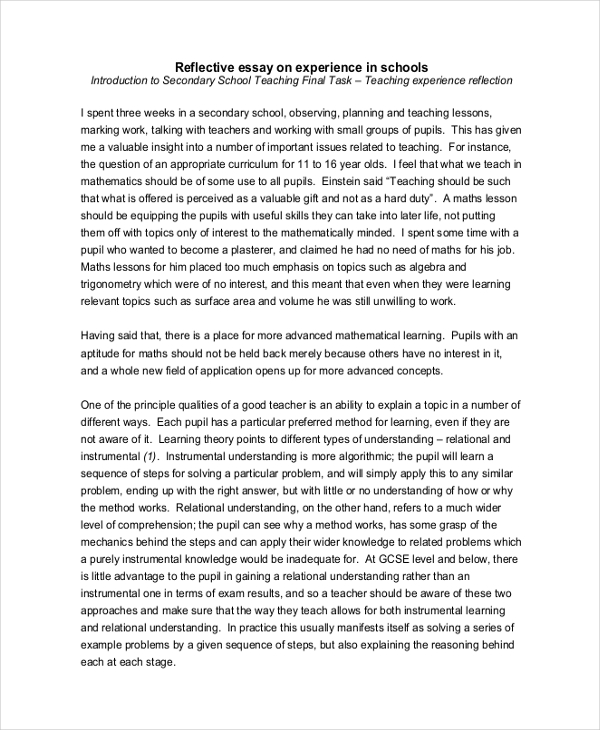
- PDFReflective Essay Example Reflective Essay Example Reflective Essay Example
Size: 102 KB
Reflective Essay Outline
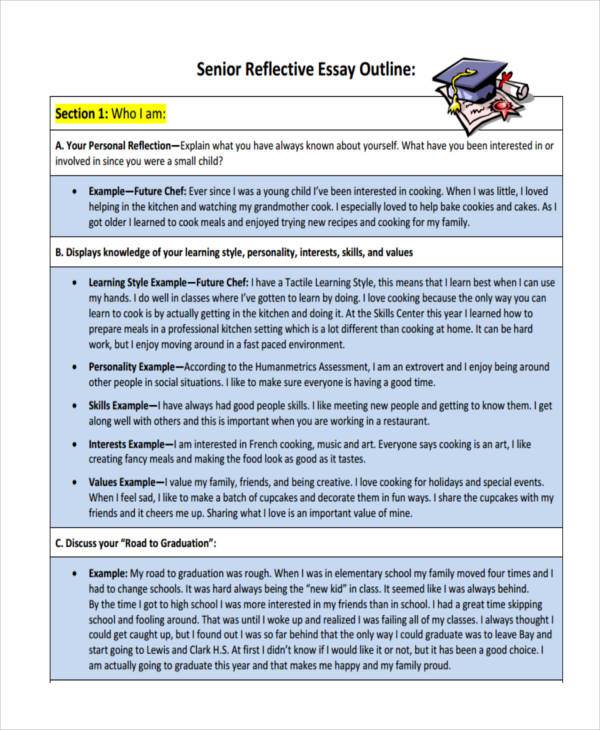
Size: 247 KB
Student Reflective Example
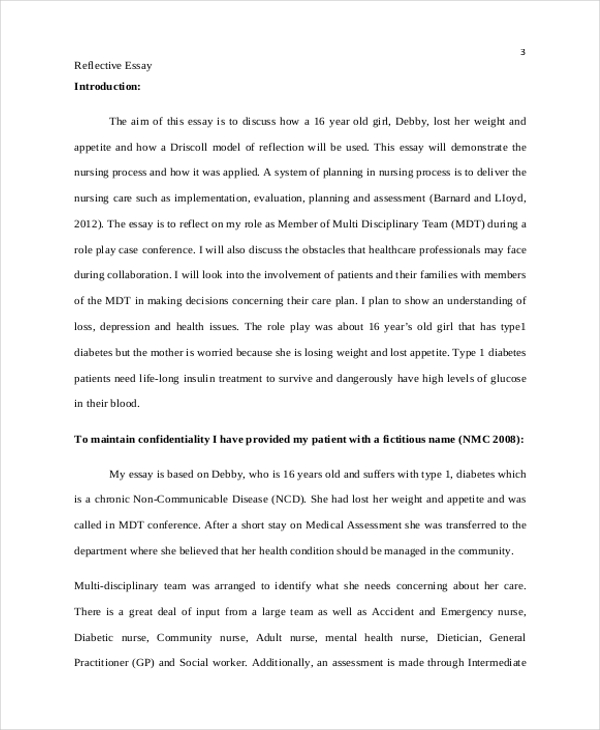
Size: 42 KB
Communication Reflective
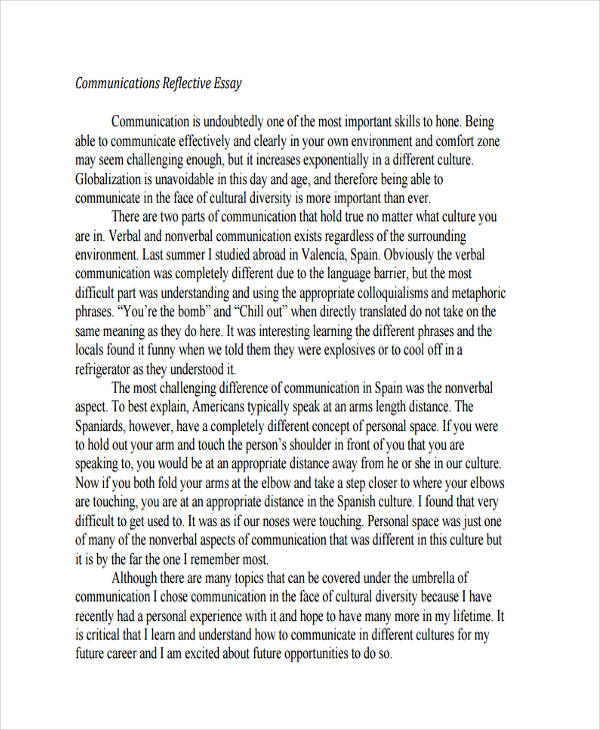
Size: 66 KB
What Is a Reflective Essay?
A reflective essay is a written piece of literature that focuses on presenting and narrating a person’s experience and how it becomes an instrument towards a change of perception in life.
It is a way for a writer to share an important event in his/her life and how it affected him/her so that others may learn something from it. Reflective writing root on life-changing events. The writer shares a specific experience, provides a narration of the incident including the material elements. It offers a realization so that others who may have had the same experience can draw out a shared mutual lesson from it.
How to Write a Reflective Essay
To write a reflective short essay , you need to have the right disposition as well as the momentum. Remember that you are not just writing to say something but to share an important lesson in life.
1. Think of an important event. What you will be writing on your reflective essay is something that is rooted in your own personal experience or encounter of something. Think deep and concentrate. You may also see personal essay examples & samples.
2. Introduce your topic. In your introduction, write the concrete event or experience that you want to share. Pattern it in a story form.
3. Develop your point. Write the main content of your essay with at least three to five paragraphs supporting your main topic.
Final Reflective Essay
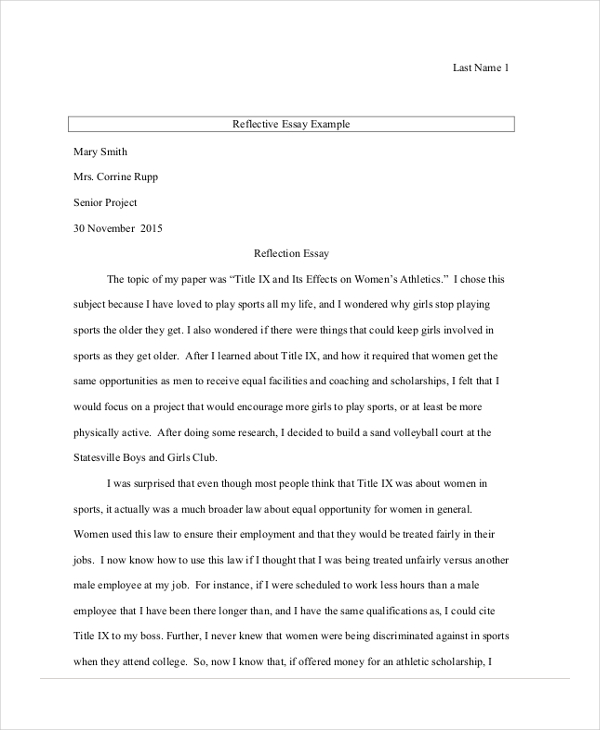
Size: 49 KB
Internship Reflective Essay
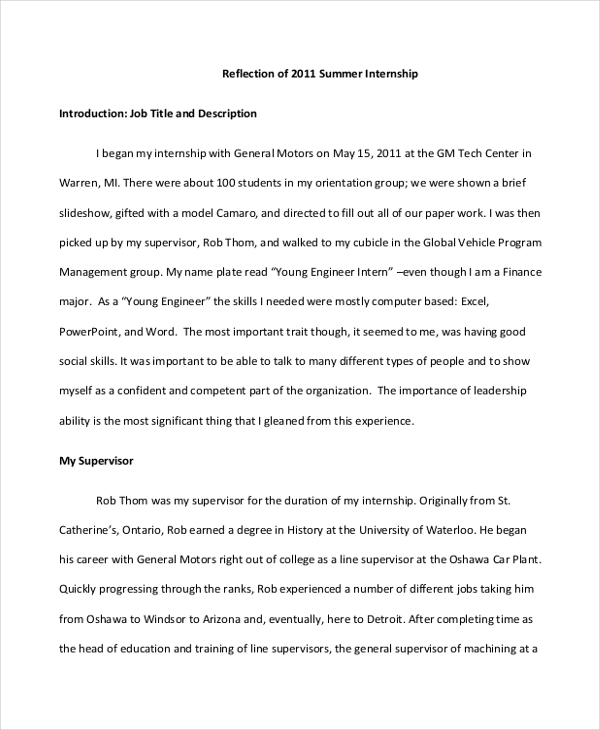
Size: 285 KB
Leadership Reflective Example
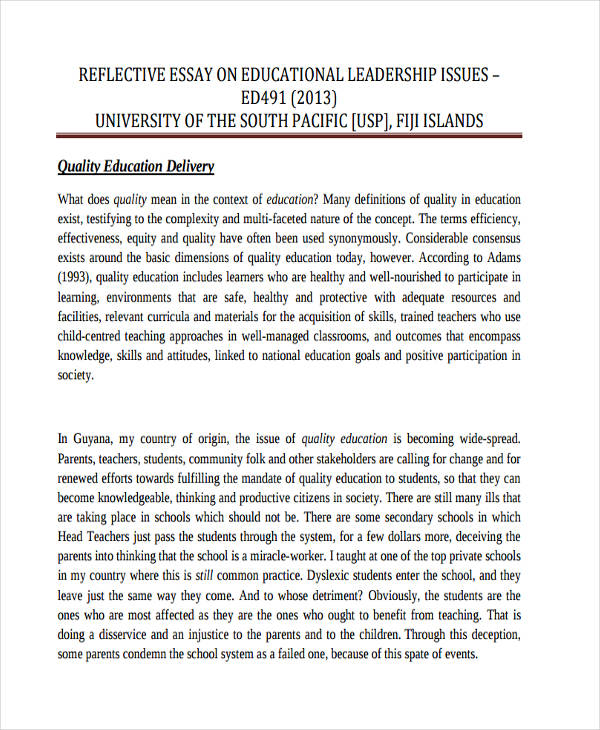
Size: 634 KB
Nursing Reflective Essay
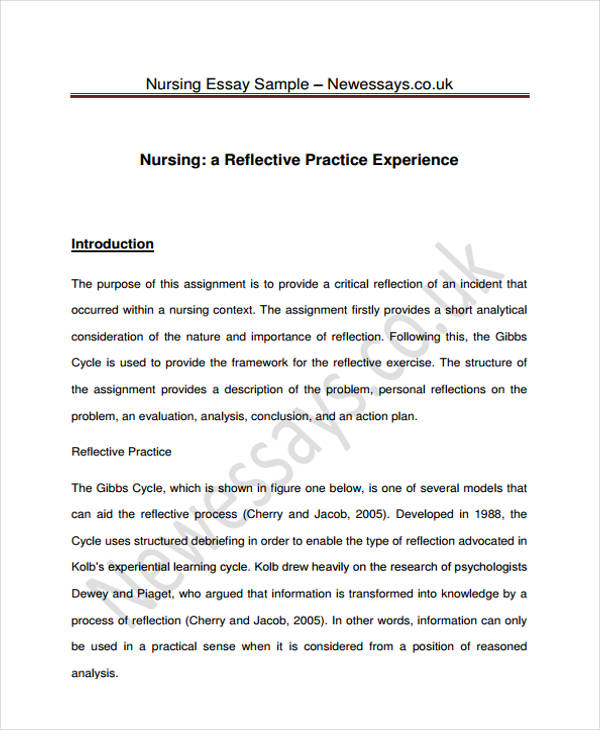
Size: 331 KB
Research Reflective Example
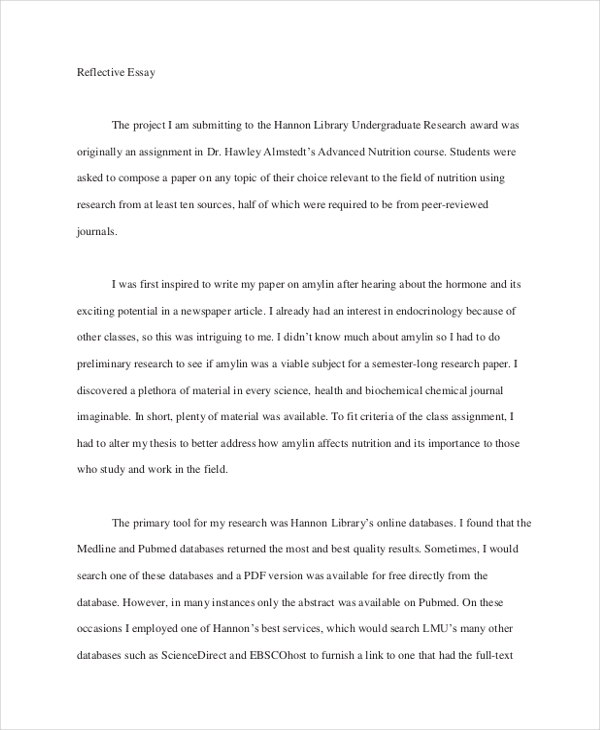
Size: 155 KB
Tips on Writing a Reflective Essay
Writing a reflective essay is not persuasive writing where you have to convince your readers to accept your opinion. You simply have to share an experience.
1. Write a draft. Do not jump hastily onto formal writing . Write a draft where you can create a bulleted list of the things that you want to share.
2. Think logically. When presenting a story, do it in a chronological manner so that your readers can understand the plot. Do this as well when presenting your ideas.
3. Create a summary. Use a summary writing to briefly state your insights and to give your final thoughts of the topic.
Importance of a Reflective Essay
In this era that we currently live in, personal reflection can be considered a thing of the past. Because of the gradual change and development of the things around us, we find it difficult to pause and reflect on the things that happen to our lives. You may also see academic essay examples .
The importance of writing an essay is to present to us the things that we rarely encounter in our day-to-day activities. In this time when material things are all that mattered, we have become unappreciative of the abstract things like love, compassion, and mercy. We cannot learn these things from those electronic gadgets that keep us busy.
How to Start a Reflective Essay Correctly
As mentioned above, a reflective essay presents and narrates the experience of a writer and how it changes the way he/she perceives life. In a simpler sense, it talks about how the author reflected on a certain adventure. As an essayist, since it’s you who bears the story and lessons, you are the one who is responsible for expressing it.
Just like any other composition, it’s your introduction that catches the attention of the reader. Thus, in order for your essay to be fully read, it is important to start your essay remarkably. If you find writing an introduction for your reflective essay challenging, don’t worry, you’re not alone. In this section, we are going to slowly tackle the ways to compose a compelling introduction.
1. Being catchy is the key.
In writing your reflective essay, you must start with something that would captivate the readers right away. Since the purpose of the introduction is to grab some attention, you may include some unique and interesting facts or beliefs. In this part, showcase your creativity by adding an introduction that is written in a bizarre manner and not those that depict cliché experience. You may also utilize a highly moving quotation or a dialogue that would also be appropriate for your reader.
2. Write the thesis statement in one sentence.
A thesis statement refers to the sentence that carries the topic being discussed in the whole essay. Therefore, it bears the central idea in which your essay revolves around. In writing your own essay, construct this statement in a clear and concise sentence. In this way, the reader will have a better grasp of your topic and would be clearly oriented on what you want to convey. In most cases, thesis statements are written at the end of the introduction.
3. Stick to the first person POV.
Remembering that this essay is subjective and depends on the author’s interpretation, it is important to use the first person point of view. By using this POV, it would be easier for you to convey your thoughts and opinions, and it would engage you to the readers like you’re telling a story in person. The first person involves the pronouns I , me , my , and mine .
4. Keep it brief.
When it comes to writing your own essay, you must perceive what your readers feel or see in reading your composition. Always put into mind that readers also have their own time to spend, and without a mark in the writing industry, people won’t invest much time on reading your essay. Thus, it is important to keep your composition concise. You can utilize a paragraph of five to ten sentences in your introduction. Using this number of sentences, you must already express a complete and clear thought of an essay that is worth reading.
Reflective Essay Example
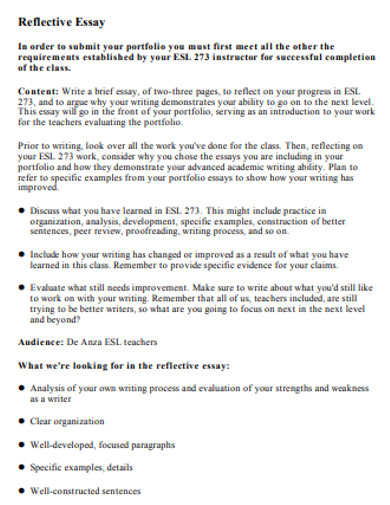
Size: 73 KB
Reflective Essay Assessment
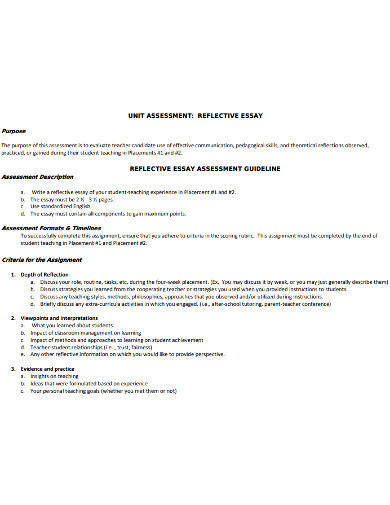
Size: 99 KB
Reflective Essay Format
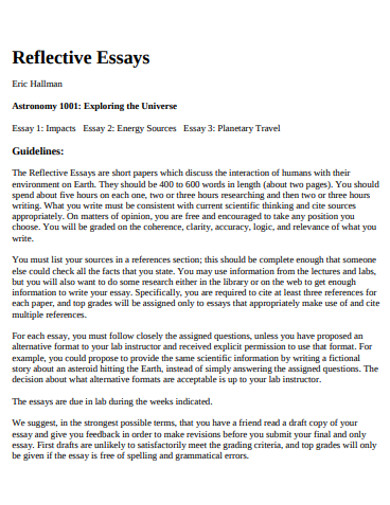
Size: 278 KB
Basic Reflective Essay
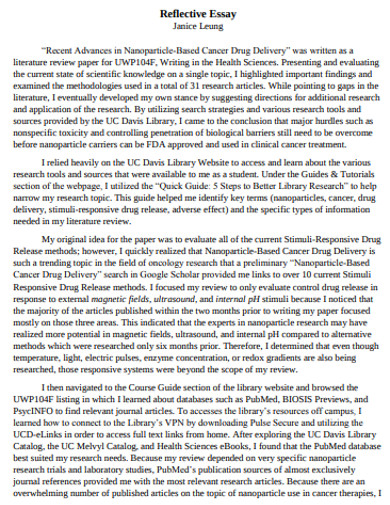
Size: 81 KB
Reflective Final Essay
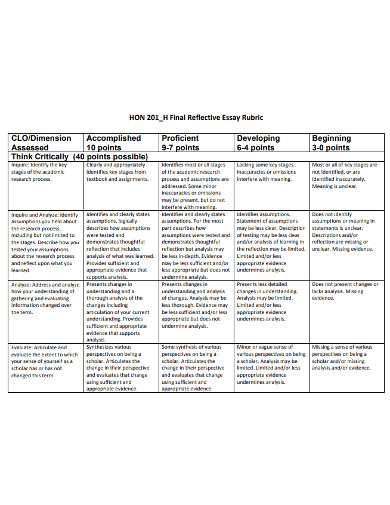
Size: 85 KB
Sample Reflective Essay
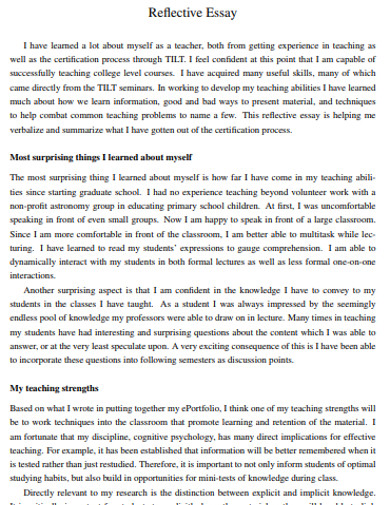
Size: 38 KB
Simple Reflective Essay Example
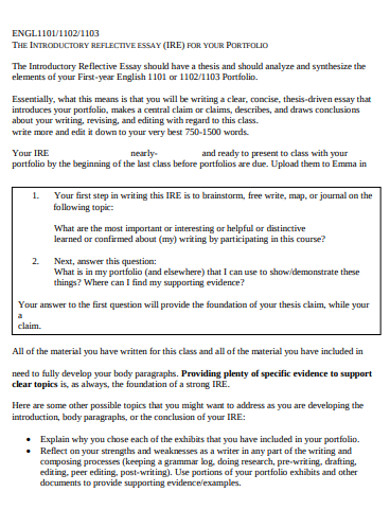
Size: 193 KB
Standard Reflective Essay
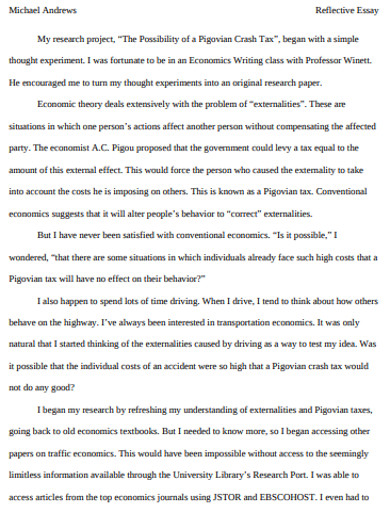
Professional Reflective Essay
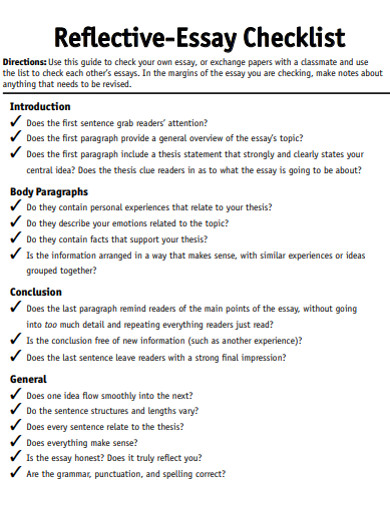
Size: 264 KB
Sample Reflective Essay in PDF
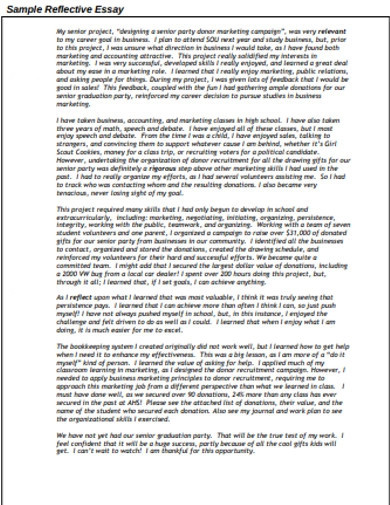
Size: 26 KB
Text prompt
- Instructive
- Professional
Write a Reflective Essay on your most meaningful learning experience.
Create a Reflective Essay about a time when you showed leadership.
How to Start a Narrative Essay: Engaging Techniques for a Strong Opening
By: Author Paul Jenkins
Posted on May 27, 2024
Categories Education , Writing
Crafting the beginning of a narrative essay sets the stage for the story you’re about to tell.
It requires choosing an engaging topic, which can be personal, fictional, or even autobiographical, and embedding a tone that captures and holds your reader’s attention.
An impactful introduction plays the crucial role of providing a glimpse into the setting, characters, and the overarching theme without giving away the entire plot.

Establishing the right narrative structure is fundamental, as a clear sequence of events maintains reader interest and drives the essay forward.
Incorporating dialogue and various literary devices enhances the vividness of a narrative essay, allowing characters to come to life.
Writing a narrative essay is about telling a story that is compelling, coherent, and leaves a lasting impression on its audience.
Key Takeaways
- The introduction of a narrative essay must captivate and set the premise for the story.
- Effective storytelling in essays involves clarity, engagement, and a thorough narrative structure.
- Revision and proofreading are essential processes in ensuring a polished final essay.
Introduction
When embarking on the crafting of a narrative essay , the introduction serves as the pivotal gateway for the reader .
It is the part of the essay where a writer has the opportunity to seize the reader’s attention and set the tone for the narrative that unfolds.
This section should encompass the beginning of the story arc while introducing the central theme in a manner that is both engaging and informative.
To captivate the reader , employ a hook —an intriguing opening line or an evocative question.
This hook could take the form of a striking statement, a vivid description, or a compelling anecdote. The goal is to pique curiosity and encourage further reading.
Structure of the Introduction:
- Example : Start with a dialogue or a pivotal moment.
- Example : Introduce the main characters and setting briefly.
- Example : Foreshadow the core conflict or challenge.
The introduction should not only hook but also smoothly transition to the middle of the essay where the main events take place.
It must ensure a coherent flow towards the eventual end of the narrative, completing the story arc in a satisfying manner.
The art of beginning a narrative essay lies in striking a balance— capturing attention and laying the groundwork for the story to come.
The author is the architect of this delicate opening, designing it to be both alluring and informative, setting the stage for the narrative adventure.
Selecting a Topic and Setting the Tone
Before starting a narrative essay, one must select a topic that resonates with their personal experiences and decide upon the tone that will carry the narrative forward. These aspects set the foundation for a compelling essay.
Brainstorming Ideas
Brainstorming is a critical step for unlocking creative themes and potential essay topics .
Using methods such as mind maps or lists can help one to visually organize their thoughts and find connections between them.
Writers should consider prompts that inspire them and reflect on personal experiences for authentic and engaging stories.
- List past experiences related to the essay’s purpose
- Utilize prompt guidelines to steer the brainstorming process
- Develop a mind map to explore different angles of a potential topic
Deciding on the Narrative’s Tone
The tone of a narrative essay shapes the reader’s perception and can vary from humorous to solemn. It should align with the theme and the writer’s intent.
When a writer has selected a topic , they must consider the emotional atmosphere they wish to create.
They ought to ask themselves what response they want to evoke in the reader.
Crafting a Compelling Opening
The beginning of a narrative essay sets the trajectory for the reader’s journey. It’s crucial to engage your audience with a powerful hook and a vivid setting.
Using a Hook
A narrative essay benefits from a hook that grabs the reader’s attention from the first sentence.
This could be a provocative question , a surprising fact , or an intriguing quote from a character.
For instance, opening with a rhetorical question invites the reader to ponder and engage directly with the essay’s theme.
Alternatively, a shocking statement can create immediate intrigue or conflict that compels the reader to continue.
- Question : “Have you ever wondered where fear comes from?”
- Quote : She whispered, “Dreams have a way of making a heart speak.”
- Shocking Statement : They never told him that the price of his dreams would be his nightmares.
Setting the Scene
Establishing the scene is about more than just describing a location. It involves introducing the characters, the ambiance, and the time frame, which provides context and grounds the narrative.
Utilizing a first-person perspective can create intimacy, which can be a powerful way to immerse readers in the essay’s universe.
Detailed descriptions enable the audience to visualize the setting and form a connection with the characters.
Developing the Narrative Structure
When creating a narrative essay, it’s crucial to construct a clear and coherent narrative structure . This ensures that the plot unfolds in a deliberate manner, maintains the reader’s interest through controlled pace and suspense, and delivers a satisfying resolution.
Outlining the Plot
An effective narrative essay begins with a detailed outline .
This provides a framework to organize events in a logical sequence while addressing essential elements of the narrative such as conflict , climax , and resolution .
The plot should be outlined as follows:
- Exposition : Introduce characters, setting, and background.
- Rising Action : Develop the conflict or challenges that propel the story.
- Climax : Bring the story to a turning point with the highest level of tension.
- Falling Action : Resolve the tensions and lead toward the closure.
- Resolution : Provide a satisfying conclusion to the story.
Carefully planning these elements enables the writer to maintain chronological order or apply a non-linear storytelling technique effectively.
Establishing Pace and Building Suspense
Manipulating the pace of a narrative essay is key to building suspense . Key strategies include:
- Vary sentence length : Short, sharp sentences can accelerate pace, while longer ones can slow it down.
- Timing of revelations : Disclose information at strategic points to keep readers intrigued.
- Use of details : Descriptive details can create an atmosphere that heightens anticipation or foreboding.
By considering how each event impacts the tension of the narrative, writers can deftly control pace to emphasize the suspense leading up to the climax .
The writer’s goal should be to guide the reader through a roller coaster of emotions, culminating in a memorable impact.
Describing Characters and Setting
To captivate readers from the start, a narrative essay needs to paint a picture of its characters and setting in vivid detail. This section will cover how to craft characters that feel alive and create a setting that immerses readers in your story’s world.
Crafting Vivid Characters
Character creation begins with descriptive language that outlines key traits and qualities.
First, consider their physical appearance, incorporating details like hair color, posture, and clothing, which can imply personality without stating it directly.
For example, a character with scruffy clothes and untamed hair might suggest a carefree or rugged lifestyle.
It’s also essential to include dialogue that reflects their unique voice, which can reveal their education level, background, and temperament.
Writers often use first-person or third-person perspectives to provide insight into thoughts and motivations, enriching the reader’s understanding of characters’ complexities.
Utilize personal anecdotes and figurative language , such as similes or subtle metaphors, to create memorable impressions of characters.
Creating an Immersive Setting
An immersive setting draws readers into the world where the narrative unfolds.
Begin by pinpointing the time period and location , whether it’s a modern city or a historical backdrop.
Use descriptive language to highlight sensory details like sounds, smells, and textures.
For instance, describing an urban setting might include the cacophony of city traffic and the aroma of street food .
Integrate vivid details that evoke the atmosphere, perhaps contrasting the warmth of a soft blanket against the chill of a dimly lit room.
Employing figurative language aids in connecting readers emotionally to the space, whether it’s through a simile describing the oppressive heat of a room as “like being wrapped in a thick blanket” or a metaphor likening the forest’s silence to a deserted cathedral.
Incorporating dialogue can also reveal the setting, such as characters commenting on their environment or reacting to changes around them.
Conveying the Theme and Message
When composing a narrative essay, the theme should serve as the compass guiding every paragraph. An effective theme is both universal and personal, resonating with the reader while offering insight into the writer’s unique perspective. It is essentially the main idea or moral of the story.
Message in narrative essays translates the writer’s personal statement and central argument into the fabric of the narrative.
As one constructs the narrative, it’s crucial to interweave the message subtly yet consistently to keep the reader engaged and impart the intended lesson.
To effectively communicate the message and theme, an author can employ various literary devices with symbolism being particularly potent. For example:
- A character’s journey may represent life’s challenges.
- Objects can hold significant meaning, enlightening the reader about the narrative’s deeper layers.
Literature is ripe with examples where authors seamlessly blend theme and message, making both an inseparable part of the reader’s experience. Writers should aspire to this balance, ensuring that neither overwhelms the other, but instead, they complement each other to enhance the story.
Writers should consider the following points:
- Identify the core: What is the heart of the story?
- Consistency is key: The theme should be evident throughout the narrative.
- Subtlety in delivery: Overstating the theme can be jarring.
Writing Body Paragraphs
When constructing the body paragraphs of a narrative essay, the writer must focus on advancing the story while ensuring emotional resonance and factual accuracy.
The narrative should unfold from one paragraph to the next with a clear purpose in support of the central theme.
Building the Narrative
The body paragraphs serve as the building blocks of the narrative essay. They should each contribute a unique scene or idea, while still connecting smoothly to form a cohesive story.
A reliable technique is to provide compelling facts and details that breathe life into the narrative.
This can be achieved by implementing a first-person point of view that adds personal depth, making the narrative more immersive.
For example, if the paragraph describes an event, the writer should include sensory details:
- Sight : “As the sunrise painted the sky in hues of gold and pink…”
- Sound : “The rustling leaves whispered secrets of the forest…”
Creating Emotional Impact
Emotion is the heartbeat of a narrative essay, and body paragraphs should evoke feelings that are fitting for the story’s events.
The writer’s choice of words and the rhythm of sentences can significantly influence the reader’s emotional experience.
For instance, short, abrupt sentences can create tension or surprise, while longer, flowing sentences may establish a serene or nostalgic mood.
A sentence like “She watched the last train leave, a heavyweight of loss settling on her shoulders,” can encapsulate a profound emotional moment within a paragraph.
Incorporating Dialogue and Literary Devices
In narrative essays, dialogue serves as a powerful tool to enhance storytelling. Not only does it develop characters and move the plot, but it also grants readers access to the characters’ thoughts and emotions.
Effective dialogue should mirror authentic speech yet remain concise and purposeful.
Literary devices deepen the reader’s experience. For instance, metaphors create vivid imagery by making indirect comparisons, which enrich the narrative and offer deeper insights.
A metaphor, such as “life is a journey,” symbolizes the comparison without using “like” or “as,” as one would with a simile.
A descriptive essay utilizes a variety of literary devices.
One such device, the anecdote , grounds the reader in a specific moment, often used at the beginning of the essay to hook the reader’s interest. An anecdote might describe a brief, impactful moment that sets the stage for the main narrative.
Additionally, comparisons —such as analogies and similes—help to clarify and relate experiences to the reader, often leading to a better understanding and connection with the essay’s themes.
Fostering Engagement and Empathy
When starting a narrative essay, the writer’s goal is to engage the audience by creating an emotional connection. To achieve this, they should consider integrating elements of empathy that resonate with readers.
- Personal Stories : These are powerful tools. A relatable personal story can immediately draw readers in, making them invested in the outcomes and challenges faced by the characters.
- Hardships and Resilience : Describing obstacles and the character’s resilience encourages readers to empathize. They should see the struggles as part of a shared human experience.
Writers can cultivate empathy by allowing their audience to walk in the shoes of the protagonist. This connection is deepened when they:
- Use descriptive language to paint a vivid picture of the character’s situation.
- Share inner thoughts and emotions to showcase the character’s humanity and vulnerability.
Finally, it is crucial to maintain a neutral and clear voice. Over-dramatization can alienate readers, while a well-crafted narrative stirs genuine emotion.
Concluding the Narrative Essay
In completing a narrative essay, one must ensure that the conclusion reaffirms the essay’s core theme and leaves the reader with a sense of resolution and reflection.
Bringing Closure to the Story
A successful conclusion serves as the final piece of the narrative puzzle. It should not introduce new information but instead, connect back to the essay’s main message or theme.
This can be achieved with:
- Summarization of Key Points : Briefly recap the primary events to remind the reader of the journey.
- Reiteration of the Theme : Clearly express how the events reinforce the central theme of the narrative.
When one wraps up their story, clarity and consistency with the established narrative are crucial to avoid confusing their audience.
Reflecting on the Journey
The conclusion is where one can offer reflection, illuminating how the narrative journey has influenced characters or the writer themselves.
Reflection should focus on:
Growth or Change :
- Discuss how characters have evolved or what lessons they may have learned.
- Illustrate the success or transformation to underscore the narrative’s impact.
Personal or Broader Implications :
- Share insights on how the story’s events extend beyond the narrative to resonate with a larger truth or societal message.
Revising and Proofreading
Revising and proofreading are critical final steps in the essay writing process. They fine-tune one’s writing skills and ensure that the narrative essay conveys its message effectively and clearly.
Revising involves evaluating the overall structure, content, and flow of the essay.
Writers should check if the story is complete, engaging, and makes a point.
They should consider the following aspects:
- Organization : Does the essay follow a logical order?
- Clarity : Are the ideas clear and well-explained?
- Consistency : Are the characters and settings consistent throughout?
Proofreading is the last step and focuses on correcting grammar, punctuation, and spelling errors.
It’s essential to carefully comb through every line to catch and rectify mistakes that could detract from the essay’s professionalism.
Tips for effective proofreading:
- Take a break after revising to approach the essay with fresh eyes.
- Read aloud to identify awkward phrasing or errors that might be missed when reading silently.
- Use digital tools, but still do a manual check, as tools may not catch everything.
Incorporating feedback from peers can be invaluable for both revising and proofreading.
Fresh perspectives can help identify areas for improvement that the writer might overlook.
Revising and proofreading should not be rushed.
They require time and attention to detail to elevate the quality of the narrative essay.
Remember, these steps may seem demanding, but they are crucial in refining writing skills and producing a polished, publishable narrative essay.
Differences from Other Essay Types
When writing an essay, it’s important to understand how the goal and structure differ among various types. A narrative essay’s primary purpose is to tell a story, in contrast to other types which aim to describe, argue, or explain.
Narrative vs. Descriptive Essays
Narrative Essays :
- Purpose : To tell a chronological story with a clear point.
- Structure : Includes characters, a setting, a climax, and a resolution.
Descriptive Essays :
- Purpose : To create a vivid image of a person, place, thing, or event.
- Structure : Focuses on sensory details without necessarily following a chronological order.
In narrative essays, the chronological flow is central, while descriptive essays do not require a story’s progression but rather elaborate on details to paint a picture.
Narrative vs. Argumentative Essays
- Focus : Shares a personal experience or story.
- Perspective : Can be subjective, offering a personal viewpoint.
Argumentative Essays :
- Focus : Presents a position on an issue with supporting arguments.
- Evidence : Utilizes facts, data, and logical reasoning to persuade.
Unlike narrative essays, argumentative essays advance a thesis through well-substantiated arguments, aiming to convince the reader of a particular stance.
Narrative vs. Expository Essays
- Approach : Utilizes storytelling elements to convey a narrative.
- Connection : Engages emotions and personal connections.
Expository Essays :
- Approach : Provides information or explains a topic in a structured manner.
- Connection : Focused on delivering facts and logical explanations.
Expository essays are informational and rely less on an emotional connection with the audience, as opposed to the more personal and emotionally driven narratives.
Adhering to Essay Requirements
When a student begins a narrative essay, understanding and following the specific requirements is crucial. Whether for high school assignments or college essays , including those for the Common App , the format and guidelines are the foundation for a well-structured essay.
High School Requirements:
- Narrative essays typically adhere to a standard five-paragraph format , consisting of an introduction, three body paragraphs, and a conclusion.
- The emphasis is usually on creative writing and storytelling.
College Essay Considerations:
- College applications may have more specific prompts and a focus on personal reflection.
- Colleges often require adherence to style guides such as APA, MLA, or Chicago.
Common App Instructions:
- Essays should recount a student’s personal experiences, detailing how they have grown or overcome obstacles.
- The narrative must fit within the stated word count, typically 250-650 words.
Formatting Tips:
- Use clear, legible fonts like Times New Roman or Arial, sized to 12 pt.
- Double-space text to improve readability.
Students should always review the essay prompt thoroughly and consider any provided rubrics or examples, which outline the expected criteria for the narrative.
One should never underestimate the importance of editing and proofreading; even minor formatting errors can detract from the content’s impact.
Tips for First-Time Writers
When first-time writers approach a narrative essay, they should focus on cultivating a habit that encourages writing exercises to strengthen their creative muscles .
- Begin with Brainstorming : Allocate time to ponder different life experiences, which can be employed as the backbone of a narrative essay. These reflections assist in finding a meaningful topic.
- Outline Your Story : Constructing an outline helps in organizing thoughts methodically. It serves as a roadmap and ensures the narrative includes a clear beginning, middle, and end.
Persistence is Key : Novice writers must remember that perseverance in the face of challenges is crucial.
- Seek Feedback : Whether from peers or an instructor , constructive criticism can be invaluable. They offer fresh perspectives that can enhance the essay’s clarity and impact.
- Read and Analyze : Studying well-crafted narrative essays can serve as a great educational tool. One can learn a lot about pacing, character development, and dialogue.
Incorporating these tips, first-time writers can navigate the nuances of a narrative essay more effectively, creating engaging and clear stories imbued with personal flair and authenticity.
Advanced Techniques in Narrative Essays
In the crafting of narrative essays, writers can employ a repertoire of advanced techniques to enhance the storytelling experience.
One of the key elements is the strategic use of literary devices .
Metaphors, similes, and personification add depth to the narrative, allowing readers to connect on a more emotional level.
Writers may also integrate dialogue, carefully punctuated with action, to bring characters to life.
An effective narrative essay outline includes a climax , the pinnacle of tension or conflict upon which the story turns.
Building up to this zenith with escalating events not only hooks the reader but also paves the way for a satisfying resolution.
In the realm of details , specificity is crucial.
Rather than broad brushstrokes, successful narratives zoom in on the small, peculiarities that render scenes vivid.
The smell of rain on pavement, the stutter in a character’s speech, and the particular shade of twilight are the types of details that create authenticity.
Leveraging Personal Challenges
Leveraging personal challenges in a narrative essay can powerfully showcase resilience and personal growth. A writer may choose to share insights on how they’ve navigated through a difficult time, providing a rich backdrop for a compelling story.
Selecting the Right Challenge: It is crucial to pick a personal hurdle that has significantly impacted one’s life.
This could be a setback , failure , injury , or a difficult situation where a passion was put to the test.
The chosen challenge should serve as a catalyst for growth or change, revealing the individual’s capacity to adapt and persevere.
- Setbacks can demonstrate tenacity.
- Failures offer a path to introspection and improvement.
- Injuries might highlight physical and mental recovery and determination.
- A stifled passion can illustrate the process of overcoming barriers to pursue a dream.
Incorporating the Challenge: When writing about personal challenges, the essay should start with a clear depiction of the issue.
He or she should employ vivid descriptions that paint a picture of the circumstances surrounding the challenge. This creates empathy and allows the reader to understand the gravity of the situation.
For example:
- The exact moment an injury occurred during a pivotal game.
- The intense emotions felt after a significant failure or setback .
Transition to Overcoming: The narrative should smoothly transition from the challenge itself to the actions taken to overcome it.
This includes the steps the individual took, the resources they capitalized on, and the support systems they leaned on. Throughout this journey, the internal transformation should become evident.
Reflection on Growth: Finally, reflecting on how the challenge was pivotal in shaping one’s character is essential.
It should illustrate what was learned, how the individual changed, and how they have since applied that knowledge or strength in other areas of life. This reflection conveys the resilience and adaptability that personal challenges can foster.
Incorporating Historical Narratives
Incorporating historical narratives into a narrative essay enriches the content, offering readers a bridge to the past through vivid storytelling.
To effectively integrate historical narratives, an essay writer must follow several key steps:
Choose Relevant History : Select a historical period or event that aligns with the essay’s theme. It should enhance the story, not detract from the narrative’s primary focus.
Research Thoroughly : Gather accurate details from reliable sources, such as historical archives, to lend authenticity to the narrative.
Create a Connection : Clearly draw lines between the historical context and the personal story. Explain the chosen history’s impact on the events or the individual experience being described.
Balance Story and Fact : Ensure the historical narrative does not overshadow the personal narrative. Use historical elements to support the story rather than overwhelm it.
Depict with Sensitivity : When handling delicate historical subjects, one must approach them with sensitivity and respect for the people and cultures involved.
- Submit Release
When Should You Start Writing Your College Essay?
Posted on May 29, 2024
Let’s be frank: there’s never an ideal moment to craft college essays. At best, there are times that are somewhat less unfavorable.
Why is that? Simply put, there’s constantly going to be something else that requires your attention right now. A more captivating event, a task that eats up more time, a thrilling experience, pressure-filled situations — you get what I mean.
Nevertheless, it’s important to tackle the task of writing your college essays, and it’s best to do so well in advance of submission dates. My extensive experience with a diverse range of students has taught me that composing an essay becomes much more manageable when divided into more digestible segments. Thus, beginning the process early, approaching it gradually, and allowing ample time for introspection and idea generation are crucial steps.
For those seeking additional support or guidance throughout the essay writing process, considering the assistance of professional essay writing services can provide valuable expertise and assistance in crafting compelling and polished essays.
When should I start writing my college essay ?
For every student, it’s best to begin thinking about essay topics early, for example, around winter during your junior year. The most challenging aspect of essay writing for college applications is identifying what to write about, as it requires extensive self-examination and time. Consequently, if your school assigns the task of composing the personal statement (also recognized as the Common App essay) in the spring, you’ll be well-prepared to tackle it.
In most cases, the best time to write my college essay is the summer following the junior year. You should aim to complete it before the senior year kicks off. By doing so, you can remove the burden of essay writing from your to-do list and concentrate on finalizing your application submissions, as well as dedicating attention to your final-year courses and extracurricular engagements.
Students planning to attend summer camp should aim to complete their personal statements before going there. Additionally, they should have all additional essays finished by October 31st.
Students aiming for Early Action or Early Decision should aim to have their essays completed by the end of September, which is a month prior to the typical ED/EA application deadlines. Doing this will ensure you have ample opportunity to review your essay and refine it if necessary before sending in your application in early to mid-October.
Students who have numerous supplement essays should aim to complete them by October 31st. It will allow you to concentrate on your senior year, where maintaining high grades is crucial, and also have ample time to respond to any potential deferrals or waitlist decisions.
When to write college essay depends on your goals and commitments other than applying for college. Yet, it is best for all students to complete their essays at least a month prior to the due date. Doing so allows ample opportunity to carefully review them, make adjustments, and refine the work without the stress of an approaching deadline.

Who can help me in crafting college application essays?
Your mentors, teachers, tutors, and professional admission essay writers can all help you maximize your chances for success. They can oversee your writing process and ensure you meet your deadlines, removing that burden from parents. Additionally, they motivate you to engage in self-reflection about your personal narratives and offer constructive criticism for every version of every essay and application. Essay writers can help you with the entire writing process, ensuring you get a well-crafted and polished essay to submit.
Reach out for help early, during your junior year in November, with the winter months being the preferable period to initiate the writing process. This gives you the necessary time to brainstorm ideas and approach the task in a thoughtful and organized manner.
Final Thoughts
Starting your college essay early is key to creating a compelling and thoughtful piece. By beginning the process during the junior year and aiming to finish by the start of senior year, students can alleviate the pressure of deadlines and dedicate the necessary time to refine their essays. Remember, the support of mentors and professional essay writers can be invaluable in navigating this crucial step towards your college journey, ensuring your essays are both profound and polished.
Read more here: https://collegian.com/sponsored/2024/05/when-should-you-start-writing-your-college-essay/ Copyright 2024
A style expert shares fresh Target finds to help you kick off summer — from $10
- Share this —

- Watch Full Episodes
- Read With Jenna
- Inspirational
- Relationships
- TODAY Table
- Newsletters
- Start TODAY
- Shop TODAY Awards
- Citi Concert Series
- Listen All Day
Follow today
More Brands
- On The Show
- TODAY Plaza
Burger King enters the fast-food value wars with its $5 ‘Your Way Meal’

The fast food value wars are heating up as diners are sick of high prices in the drive-through lane.
Burger King confirms to TODAY.com it will be re-releasing a $5 value meal in the hopes of attracting cash-conscious customers. The fast-food royal is the latest in a long line of national chains to announce a lower-cost meal as they report lower traffic and profit declines.
“Burger King is accelerating its value offers after three quarters of leading the industry in value traffic,” a Burger King spokesperson tells TODAY.com. “We are bringing back our $5 Your Way Meal as agreed upon with our franchisees back in April.”
The move was first reported by Bloomberg , which obtained a Burger King memo discussing the deal. According to the report, the value meal would feature a choice of one of three sandwiches with nuggets, fries and a drink.
Additionally, Burger King plans to relaunch the meal before McDonald’s drops its own similar deal in June. CNBC reported in May that McDonald’s USA would be introducing a $5 value meal for one month on June 25. Customers will be able to pick between a McChicken and McDouble, which will come with a four-piece McNuggets, fries and a drink.
Unlike the Golden Arches, Burger King plans to offer its meal “for several months,” per the memo signed by Tom Curtis, president of Burger King U.S. and Canada.
Burger King previously offered $5 Duo deals which came with a choice of any two items from a selection of BK Royal Crispy Wrap flavors and/or a Whopper Jr.
The chain’s latest announcement comes as drive-through fans voice their displeasure with expensive fast food, and chains like KFC and Starbucks report sales declines .
Folks have been posting about eye-popping fast food prices on TikTok, X and beyond. Viral complaints about the cost of $17 for two Filet O’ Fish sandwiches and $3 for a single hash brown shows prices have been driving these customers away. Now, from Buffalo Wild Wings to Wendy’s, Pizza Hut and more, restaurants are finally listening.
Quick-serve sit-down restaurants are also joining in on the value wars. In April, Denny’s announced the return of its low-priced All-Day Diner Deals starting at $5.99 while Applebee’s and Chili’s have their own low-cost offerings , too.
John Peyton, CEO of Dine Brands (the Applebee’s and IHOP parent company), also told TODAY.com his company has been looking at consumer spending patterns and is prepared for a shift towards more value-focused purchases.
Washington, D.C. native Joseph Lamour is a lover of food: its past, its present and the science behind it. With food, you can bring opposites together to form a truly marvelous combination, and he strives to take that sentiment to heart in all that he does.

A timeline of the lawsuits Panera is facing over its Charged Lemonade

While some companies market ‘natural’ MSG, my restaurant will stick with the original

McDonald’s exec says average menu item costs 40% more than in 2019
Restaurants.

Amazon Prime members can now score free Grubhub delivery nationwide

66 restaurants open on Memorial Day for when you’re over all the barbecues

35 Memorial Day food deals to help you kick off the summer

Is Chick-fil-A open on Memorial Day? What to know about the restaurant’s holiday hours

Is McDonalds open on Memorial Day? Here’s what you need to know about hours

Is Dunkin’ open on Memorial Day? Find out store hours for your holiday fix

Buffalo Wild Wings mocks Red Lobster’s bankruptcy with new bottomless chicken deal

IMAGES
VIDEO
COMMENTS
A major, life-changing event. Something that you did over and over that was meaningful to you. Your experience and memories of a place that embodies who you are or has meaning for you. A time you were scared but overcame your fear. An ending of a relationship, activity, or event. A beginning of something new.
The Process of Writing About Personal Experiences. Here is a comprehensive guide outlining the steps for writing about personal experiences: 1. Preparation: Before starting the drafting process of your personal experience essay, consider immersing yourself in the art of narration by studying a well-crafted sample.
Here are some tips to get you started. Start early. Do not leave it until the last minute. Give yourself time when you don't have other homework or extracurriculars hanging over your head to ...
Sample College Essay 2 with Feedback. This content is licensed by Khan Academy and is available for free at www.khanacademy.org. College essays are an important part of your college application and give you the chance to show colleges and universities your personality. This guide will give you tips on how to write an effective college essay.
Step 1: Choose a Topic. If you're old enough to write a personal essay, you've lived long enough to have a wealth of experiences to write about. You may think nobody would want to read about your boring life, but you're wrong. The key is simply choosing the right experiences to write about.
Interactive example of a narrative essay. An example of a short narrative essay, responding to the prompt "Write about an experience where you learned something about yourself," is shown below. Hover over different parts of the text to see how the structure works.
Write the introduction. Write the body. Write the conclusion. 1. Make preparations. When preparing to write your personal essay, first consider who your audience is and what you want them to know. Ask yourself questions to determine how your story relates to your goals for writing it.
Focus on a specific moment, and describe the scene using your five senses. Mention objects that have special significance to you. Instead of following a common story arc, include a surprising twist or insight. Your unique voice can shed new perspective on a common human experience while also revealing your personality.
One way to start your essay is to begin with a memorable detail from the event's climax, then go back chronologically in the essay's body to show readers how you got there. For example, if you're writing about doing speech competitions in high school, you might open with a description of receiving a trophy at a tournament.
Good example. I wiped the sweat from my head and tried to catch my breath. I was nearly there—just one more back tuck and a strong dismount and I'd have nailed a perfect routine. Some students choose to write more broadly about themselves and use some sort of object or metaphor as the focus.
For many, getting started is the hardest part of anything. And that's understandable. First, because it turns whatever you're doing into a reality, which raises the stakes. Second, because where you start can easily dictate the quality of where you end up. College essays have their own special brand of DTDT.
An Unforgettable Experience in My Life. Essay grade: Excellent. 2 pages / 719 words. In this personal narrative essay sample explores the unforgettable day when the narrator's grandfather passed away. This event marked a poignant realization of life's unpredictability and the enduring impact of loss.
Intriguing ways to start an essay. There are many different ways to write an essay introduction. Each has its benefits and potential drawbacks, and each is best suited for certain kinds of essays.Although these essay introductions use different rhetorical devices and prime the reader in different ways, they all achieve the same goal: hooking the reader and enticing them to keep reading.
Font: Unless required to write in a Harvard essay format, you can use any readable fonts - Times New Roman, Arial, or Calibri in size 12.; Margins: Just like in most writings, set your margins to one inch on all sides.; Spacing: This is a classic!Use double-spacing throughout the essay, including between paragraphs. Indentation: Indent the first line of each paragraph by 0.5 inches or use the ...
4 Create an outline. All it takes to understand the importance of an outline is listening to someone who struggled to tell a personal story. Often, the story will seem to have no real point. The switchbacks where the teller says "But wait, I have to tell you about this part, first!" are maddening and disruptive.
Written by MasterClass. Last updated: Sep 9, 2021 • 3 min read. People write personal essays for a number of reasons. High school students write them for college admissions and writers use them to share personal stories with others. A personal narrative essay can enlighten and inspire an audience with information gained from real life ...
The Bottom Line: How to Start a College Essay. The college essay introduction should hook your reader and make her want to know more and read more. Good personal statement introductions will contain the following features: A killer first line. A detailed description of an experience from your life.
1 Choose a tone. Before you begin to write your reflective essay, choose a tone. Because a reflective essay is more personal than an academic essay, you don't need to use a strict, formal tone. You can also use personal pronouns like I and me in your essay because this essay is about your personal experiences.
5 How to write essay on personal experience of travelling. 5.1 Tips for writing a travel essay. 6 Personal experiences essay example. The story of my trip to Pakistan. How I stayed safe. 7 How to write about real events. 8 Personal experiences essay example. Today I almost died.
Ignoring the prompt: This is a major key. STAY ON TRACK. Make sure to carefully read and understand the essay prompt, and write your essay accordingly. The last thing you want to do is write a college essay that has nothing to do with the prompt. Reading is essential here.
Table of contents. Step 1: Hook your reader. Step 2: Give background information. Step 3: Present your thesis statement. Step 4: Map your essay's structure. Step 5: Check and revise. More examples of essay introductions. Other interesting articles. Frequently asked questions about the essay introduction.
The writer of the academic essay aims to persuade readers of an idea based on evidence. The beginning of the essay is a crucial first step in this process. In order to engage readers and establish your authority, the beginning of your essay has to accomplish certain business. Your beginning should introduce the essay, focus it, and orient ...
Tips on Writing a Reflective Essay. Writing a reflective essay is not persuasive writing where you have to convince your readers to accept your opinion. You simply have to share an experience. 1. Write a draft. Do not jump hastily onto formal writing.Write a draft where you can create a bulleted list of the things that you want to share.
Writers should consider prompts that inspire them and reflect on personal experiences for authentic and engaging stories. List past experiences related to the essay's purpose. Utilize prompt guidelines to steer the brainstorming process. Develop a mind map to explore different angles of a potential topic.
The essay writing process consists of three main stages: Preparation: Decide on your topic, do your research, and create an essay outline. Writing: Set out your argument in the introduction, develop it with evidence in the main body, and wrap it up with a conclusion. Revision: Check your essay on the content, organization, grammar, spelling ...
Students who have numerous supplement essays should aim to complete them by October 31st. It will allow you to concentrate on your senior year, where maintaining high grades is crucial, and also have ample time to respond to any potential deferrals or waitlist decisions. When to write college essay depends on your goals and commitments other ...
Burger King confirms to TODAY.com it will be re-releasing a $5 value meal in the hopes of attracting cash-conscious customers. The fast-food royal is the latest in a long line of national chains ...
Make a claim. Provide the grounds (evidence) for the claim. Explain the warrant (how the grounds support the claim) Discuss possible rebuttals to the claim, identifying the limits of the argument and showing that you have considered alternative perspectives. The Toulmin model is a common approach in academic essays.